07
Product showcase: MFS Investment Management
Opinion: Jenneke Mills, Insignia Financial

07
Product showcase: MFS Investment Management
Opinion: Jenneke Mills, Insignia Financial
Australia’s economy balances precariously, with experts divided whether a slowdown or recession lies ahead. As rising inflation and interest rates encumber the economy, Australia’s prospects for 2023 remain uncertain.
Vanguard senior economist Alexis Gray says that as interest rates have risen over the course of last year, the economy has slowed down.
“It’s quite clear that interest rates are starting to bite,” she says.
“For example, house prices have fallen by over 8%, nationally consumer confidence is quite weak, and retail sales are trending lower. The economy ended the year in a weaker spot than it started.”
Gray believes that the Australian economy will continue to slow as interest rates continue to rise.
Vanguard forecasts the Reserve Bank of Australia (RBA) to up the cash rate to 3.85% before stabilising. This will help bring inflation down slowly over the next 12-24 months, Gray says.
But, the impact of higher interest rates is expected to slow economic growth, increasing recession risks.
“Recession risk is higher than normal because we’re in a high inflation and high interest environment; we put the risk of recession at 40%,” she says.
“It’s not our base case, but we’re concerned that Australia has a recession this year.”
Nevertheless, the economy is in a relatively good position compared to other regions.
In Europe, Gray labels the risks of recession as being very high, particularly as sanctions have led to exorbitant energy prices. The US is much the same, with an elevated risk of recession in 2023, she says.
“Australia is fortunately in a slightly better position; in that we are net exporter of energy. For us there is some benefit to the very high energy prices of recent years,” Gray explains.
“Australia also hasn’t had the same inflation levels that have been seen in Europe and the US.
“We’re also a close trading partner of China who’ve just exited a zero COVID policy and are on the cusp of big economic recovery. That should provide a tailwind for Australia at a time when the rest of the world is leaking a little bit weaker.”
This is backed by BetaShares chief economist David Bassanese, who says even with a high probability of a US recession, Australia is well-equipped
13
Executive appts: abrdn, Dimensional, Zurich 14
Feature: Platforms
22
Events: FPA Professionals
Congress 2022
32
Profile: Andrew Pease, Russell Investments
to handle the impact, with wages growth still low allowing the RBA to pivot quickly.
Additionally, China’s reopening should support commodity markets and exports which could further mitigate recession risks.
Still, Australia could be impacted negatively.
“China has a housing bubble to deal with, the reliance on top-down property development as a source of regional growth is passing its used by date, and it’s hard to see what will replace it,” Bassanese says.
The ongoing Russia-Ukraine trade conflict, along with the possibility of a resurgence in energy prices if other countries become involved, are also factors that could potentially have a negative impact on the economy, he adds.
Regarding markets, Gray notes that it’s been a tumultuous few years making it difficult to price assets.
“We’ve observed volatility, not only in the equity market, which is fairly normal, but also in the bond market where investors typically expect a steady stream of returns; that hasn’t happened,” Gray says.
“The challenge for last year was that we saw contractions in both the equity and bond markets at the same time, which was painful, particularly for retirees who rely on a stable income stream from bonds. But looking ahead, given that valuations are lower, they’re more attractive in our view.”
The investment manager expects Australian and global equity market returns to be between 4% and 7%, annualised on a nominal basis over the next decade. Fixed income is forecast to be slightly lower, around 4-5%, an increase of approximately 200 basis points relative to a year ago.
Based on current global economic conditions, Bassanese says investors may want to consider defensive sectors such as utilities and healthcare. However, if the US enters a recession, it’s likely to impact all sectors, particularly commodities.
Bassanese’s main message for financial advisers is to stay calm and stay informed.
“The silver lining out of all this is that central banks aren’t going to make the big mistakes of the 1970s,” he says.
“We could have a period of weakness that helps bring down inflation and contain inflation expectations and thereafter we can move onwards and upwards.” fs
Future Fund has posted a -3.7% return for calendar year 2022.
Its chair Peter Costello explained that the S&P ASX 200 falling 5.5% and the S&P 500 dropping 13.6% caused the Future Fund to deliver a negative outcome.
“The cycle of rising rates to control inflation is not yet complete and brings with it the possibility of recessions in much of the developed world. The extent of further tightening and the ways in which markets and economies respond to them will be the key issues for investors,” he said.
Future Fund chief executive Raphael Arndt added the fund remains focused on protecting the portfolio from a range of scenarios.
“… including sticky inflation leading to prolonged higher rates and the risk of a global recession, while seeking opportunities to generate long-term returns,” he explained.
Future Fund further reported a total of $243 billion in funds under management (FUM) and said
Continued on page 4
Financial advisers need a balanced regulatory framework, says Michelle Levy, lead of the government’s Quality of Advice Review (QAR).

At an event hosted by PritchittBland, Levy said almost all stakeholders are unhappy with the current system; financial advisers feeling burdened by excessive regulation, leading them to increase fees or leave the profession.
Banks, insurers, wealth managers, and superannuation funds are also struggling with the uncertainties and disproportionate risks in the law, causing many to stop offering personal advice altogether.
“I don’t think that anyone told me that things were going well. Many people also told me that all that was needed was modest changes to the law, things around the edges,” Levy said.
“They suggested things like reducing the steps in the safe harbour or reducing some of the content requirements for statements of advice, removing annual consent requirements for
Continued on page
The Consumer Price Index has peaked at 7.8%.
Not only does the 1.9% increase for the December quarter mark the fourth consecutive rise greater than any seen since 2000, but inflation is now the highest it’s been in over 30 years – almost 33 years, to be exact.
A sizeable jump in the December quarter is typically expected, but it was a bigger jump than most economists and commentators anticipated.
And while most are now saying we’ve reached the inflation peak, this increase has all but guaranteed another interest rate rise from the RBA for February, to be passed on by the banks at record speed, no doubt. But even if this is the last increase, the likelihood they’ll fall just as fast as they rose is slim; the damage has already been done.
Despite talk of Australians tightening their belts, spending data has barely reflected it. However, the Australian Retailers Association reported in January that retail sales were down almost 4% in December. While annual spending is still up 7.5%, it was the first decline in 11 months and spending has been gradually slowing, meaning the pinch is being felt.
What I find interesting is how much of the talk surrounding the cost-of-living crisis centers on homeowners or retirees when the reality is that young Australians are suffering too, and likely more so. According to Finder, four in five Generation Zs have had to reduce their spending, compared to just half of Baby Boomers. Further, 49% of young people reported feeling unprepared for making key financial decisions amid inflation.
But who can they turn to? They’re the demographic that most needs financial advice and they’re also the least likely to be able to afford it. And it’s not a new thing – younger generations have been facing greater financial hurdles than older generations for decades. It’s simply a fact.
Now, data from VanEck shows the “advice” dished out by finfluencers is becoming less and less effective too, my guess being because so much of it relies on having paid down debts, which is becoming less and less achievable.
I suppose the young people of Australia can hold out hope that they’ll in some way benefit from the elusive great wealth transfer that was apparently going to happen any day
now. That is, if their parents feel like sharing. So, what’s to become of the young people of Australia, being charged exorbitant rent, priced out of the housing market, paying back everincreasing student debts?
If there is any silver lining to be found, perhaps it will be in the Quality of Advice Review’s final report. While it may not be to all the industry’s liking, Michelle Levy has reinforced that her job was to act on behalf of consumers and to find ways of making advice more affordable and sustainable.


While we wait what feels like forever for her recommendations to be released, maybe there is hope for young people yet. fs
APOLOGY: The special feature in the January 23 edition of the Financial Standard newspaper featured comments from MFS Investment Management portfolio manager Ryan McAllister. Unfortunately, in several instances his surname was spelled incorrectly. Financial Standard apologises to MFS Investment Management and Ryan McAllister for the error.


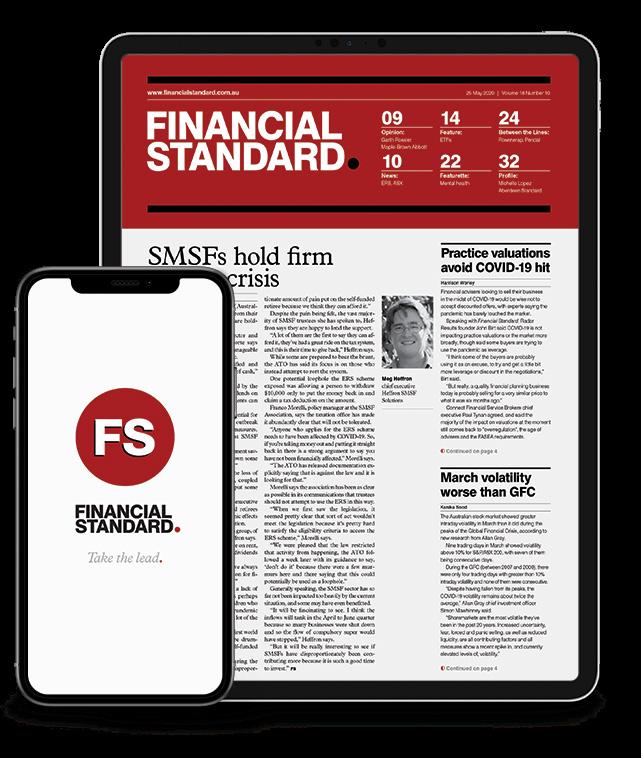
HESTA is once again calling for the Australian government to address gender inequities in superannuation and improve financial security for women.
In its pre-budget submission, the super fund said tracking and closing gender gaps remain its top priority.
HESTA stressed one way to close the gender super gap is for government to pay super as part of the Parental Leave Pay Scheme, thus addressing the motherhood penalty.
“Women suffer the consequences of reduced super when taking time off work to care for children,” it explained.
“This is inequitable and disproportionally unfair.”
Modelling by the fund highlights the positive impact of paying super to parents on leave.
It found, an early childhood educator with three children could have as much as a 6.5% boost to their super savings while an aged care professional with two children could see her super get an additional 4.2% at retirement.
Meanwhile, a mother with two children who is working in the community services industry could retire with up to 7.1% more super if super was paid on the Parental Leave Pay Scheme.
“Women already suffer as their earnings reduce by 55% in the first five years of parenthood, further exacerbating the gender super gap and risking women’s financial security in retirement,” it said.
“This (adjustment) is potentially life changing for HESTA members on low and middle incomes.”
It further added other key recommendations to reform superannuation settings are around tax concessions.
It explained due to super being taxed at 15%, lower income earners in the bottom brackets are hit harder on super than wages, while workers in the second lowest tax bracket received no tax benefit on their super.
It argued that the government’s Low Income Super Tax Offset (LISTO) eligibility no longer supports lower income earners, who are most likely women, following 2017 increases in super guarantee and changes to the income tax brackets.
“A worker must earn less than the fulltime minimum wage to be eligible for this tax concession, making the LISTO an equity measure that does not adequately compensate most of our lowest paid for the additional tax they have paid,” it said.
“The current $500 cap equates to less than the tax paid on the 10.5% super contributions by individuals with incomes above $31,7465.” fs
 chief executive Australian Institute of Superannuation Trustees
chief executive Australian Institute of Superannuation Trustees

The Australian Institute of Superannuation Trustees (AIST) is calling on the government to extend anti-hawking laws to combat financial advice firms using third parties to solicit business through cold calling.
Unsolicited calls to consumers about superannuation advice should be banned, the industry body said in its pre-budget submission, adding that it is aware of several financial advice businesses employing intermediaries to gain business this way.
Following the Royal Commission, anti-hawking rules related to superannuation products were put in place, however they don’t cover financial advice services.

AIST chief executive Eva Scheerlinck said she is concerned the existing anti-hawking legislation doesn’t cover cold calling advisers who charge up to $6000 “to roll consumers from high performing, low fee profit-to-member funds into poorer performing retail funds.”

“A typical experience was for a super fund member to be cold called by an intermediary
generating business for a financial planner, told their fund was “high risk” and all their money would go to the government if they died, emailed documents including a completed application for a retail fund and an invoice for advice that was not provided, and told to sign immediately. They are then charged thousands of dollars in fees to roll the money over,” AIST said.
Scheerlinck said several cases have been report to ASIC but that the regulator pursuing advisers is time consuming and would not address the systemic risk to consumers.
“We all know the feeling of receiving an unsolicited call from a number we don’t recognise and speaking to somebody we don’t know who is trying to sell us something we don’t need or even want,” Scheerlinck said.
“When they’re selling financial services like superannuation advice to skirt around a gap in the law and trying to bamboozle consumers with half-truths into signing up for a costly service that is not in their financial interests, it should be outlawed.” fs
Diversa is winding up DIY Master Plan, saying it is in the best interests of members, who will now be transferred to HUB24 Super.
Established in 2007, DIY Master Plan is a solution for financial advice groups looking to offer their own superannuation product. According to APRA data, as at December 2021 the fund had about $927 million in funds under management and 3124 members.
These members have now been notified that DIY Master Plan is to be wound up on or around March 1. All the products within DIY Master Plan are to be moved to HUB24 Super by way of a successor fund transfer. These include Affinity Super, Henderson Maxwell Pension and Super, MAP Super, VIP Super and Redgum Super among them.
“Diversa has decided to adopt this course because it considers it is in the best interest of all members of the DIY Master Plan,” Diversa said.
DIY Master Plan has about 12 products under its umbrella, all of which will close as part of the consolidation. All members will become members of HUB24 Super unless they elect otherwise.
The notice sent to members coincided with Diversa have additional conditions placed on its RSE licence by APRA, with the regulator flagging serious concerns about its ability to manage
When they’re selling financial services like superannuation advice to skirt around a gap in the law... that is not in theirfinan interests, it should be outlawed.
Continued from page 1
the first half of FY23 delivered a positive return of 0.9%.
“The board continues to focus on positioning the portfolio to be resilient to a range of possible developments while delivering attractive riskadjusted returns. We expect that real returns to investors, with the context of significant inflation, will be substantially below the experience of recent years,” said Costello.
Arndt said: “In December we released a new position paper, posing the question of whether the new market conditions mean ‘The Death of Traditional Portfolio Construction?.’ It notes that many of the tailwinds that have propelled investment over recent years have turned into headwinds that will make it tougher for investors to generate returns in years to come.”
“The portfolio continues to be positioned towards the middle of the range of risk settings. Over the past year we have, however, made significant changes towards investments that rely more on investor skill than on market risk, in line with our thinking that such an approach will be better rewarded as rising rates and slowing growth will drag on market returns.”
Since inception, Future Fund has returned 7.6% per annum. In 2022 it was targeting 11.8%.
As of the end of 2022, its highest weightings are to alternatives and private equity, following by global equities and cash.
In December, the government elected to proceed with a legislative amendment to exempt Australian subsidiaries of the Future Fund board from corporate income tax. Currently, the Future Fund board is exempt from income taxes, but this exemption doesn’t extend to its wholly-owned subsidiaries. fs
Continued from page 1
ongoing fee arrangements, or expanding special exemptions.
“But none of these changes would make good financial advice available to a large number of people.”
Levy said that she received consistent feedback on the problems with the current financial advice regulatory regime. However, the suggestions for fixing these issues weren’t consistent.
Though, Levy reinforced that her role wasn’t to mediate between conflicting views or find a compromise. Instead, her role was to recommend changes that would improve the accessibility and affordability of the quality of advice.
“My recommendations don’t reflect a synthesis of suggestions or recommendations by stakeholders; they reflect my assessment of what I think should be changed in the regulatory framework,” Levy said.
She hopes these changes will make it easier for advisers and financial institutions to provide advice, while also being in the best interest of consumers.
Earlier this month, as reported by Financial Standard, a Treasury spokesperson indicated that industry can expect the Quality of Advice Review to be released in the coming weeks. It was delivered to the government on 16 December 2022. fs
As we look to broaden our growth across markets, our focus will be on enhancing our specialised areas to meet client needs.
01: Georgina Dudley chief executive JANA
Jamie Williamson
The management team at JANA now fully owns the asset consultant, having bought out the 45% interest owned by Insignia Financial following its acquisition of MLC.
JANA and Insignia have entered into a binding share sale agreement for the former’s management team to buy the 45% stake which MLC Wealth had owned since 2017 when JANA’s management acquired 55%. The shareholding transferred to Insignia when it, then IOOF, snapped up MLC.
As part of the agreement, the responsible entity for close to $8 billion in funds under JANA’s implemented consulting offering has been transitioned to an alternative provider. Insignia will remain a client of JANA.
JANA clients were informed of the change ahead of time, with chief executive Georgina Dudley01 telling Financial Standard: “We expect a positive reaction from clients, who have experienced the benefits of partial management ownership. Since the initial buyout, JANA has seen significant growth, with funds under advice growing from $350 billion to $1.3 trillion.”
She added that full management ownership is a significant step in the evolution of the business, will improve JANA’s ability to attract, retain and develop talent, and links staff directly to the success of the business and its clients.
The buyout – the terms of which remain confidential – also gives the JANA team the autonomy to pursue its growth strategy, which Dudley said includes expanding its service offerings to meet clients’ evolving needs.
“With the consolidation of super funds resulting in growth, we’re seeing more clients
bring their capabilities in house. This requires greater services to support boards with their fiduciary responsibilities by providing independent advice, oversight and assurance and an understanding of best practice,” Dudley said.
“We’re also continuing to support the funds’ internal investment teams with our ability to go deeper into specialist areas and provide extra agility to respond to their needs in this changing world. This is leading to an increasing amount of funds undertaking project work in key areas such as new specialised investment opportunities, navigating regulatory changes or evolving stewardship policies.”
In terms of new markets, Dudley said JANA is focused on other institutional sectors “including those which previously may not have had an investment consultant or used other models but could deeply benefit from our expertise and services.”
Enhancing its specialist capabilities is also a priority, she flagged.
“As we look to broaden our growth across markets, our focus will be on enhancing our specialised areas to meet client needs,” Dudley said.
“For example, we are seeing more of our clients take a holistic approach to sustainability and net zero which requires a robust framework to ensure that our clients can measure and understand the impact of their decisions while supporting the integration of sustainable practices into all parts of the investment process.”
The deal is expected to be completed this month, at which time Insignia Financial chief asset management officer Garry Mulcahy will step down from the JANA board, alongside the ASX-listed firm’s other representative. fs
The regulator has placed additional conditions on the trustee’s RSE licence, flagging serious concerns with Diversa’s ability to manage risks and deliver quality outcomes for members.
APRA explained that the new conditions are designed to address concerns related to the adequacy of Diversa’s resources to manage risks and meet regulatory and compliance obligations; heightened inherent business risks driven by the complex structure and operations of Diversa; and concerns related to Diversa’s ability to deliver quality member outcomes, including in relation to high fees and poor investment performance.
They seek to codify recommendations of a third-party review of Diversa’s operating model, APRA said.
Diversa is home to about 320,000 members and over $11 billion in retirement savings. It is trustee of several superannuation products, including Future Super, Verve Super, and ING Superannuation. It also provides trustee services to the Tidswell Master Superannuation Plan, which is home to Cruelty Free Super, mobiSuper, Spaceship and Student Super, and OneSuper, whose sub-plans include Allan Gray Super and Superhero Super.
APRA deputy chair Margaret Cole said the conditions set baseline expectations for independent trustees.
“The inherent complexity of the independent trustee model, with one trustee having oversight over a substantial number of funds, sub-funds and products, requires significant resourcing to ensure quality member outcomes,” Cole said.
“These licence conditions set the minimum standard for governance, risk, outsourcing and oversight, and member outcomes to ensure that Diversa is in the best position to continue as a trustee in the long term.”
Diversa and its suite of super products has been plagued with scandal in recent times. Last year, numerous products were shuttered after they failed to reach meaningful scale.
In December 2022, ASIC fined Diversa over alleged greenwashing. The allegations related to statements made by Cruelty Free Super which overstated the use of investment screens.
In August 2022, mobiSuper and its licensee ZIB Financial paid $250,000 for breaching superannuation advice laws. fs
The government has released a consultation paper outlining possible amendments to the nonarm’s length income (NALI) provisions relating to superannuation funds.
It explained a potential change to self-managed superannuation funds and small APRA-regulated funds would be amending both to a factor-based approach.
If amended, both would have an upper limit on the amount of fund income taxable as NALI due to a general expenses breach.
“The maximum amount of fund income taxable at the highest marginal rate would be five times the level of the general expenditure breach, calculated as the difference between the amount that would have been charged as an arm’s length expense and the amount that was actually charged to the fund,” Treasury stated.
“Where the product of five times the breach is greater than all fund income, all fund income will be taxed at the highest marginal rate.”
It added large APRA-regulated funds would be exempted from the NALI provisions for general expenses.
Last year, Treasury announced it would review NALI, outlining the aim was to reform the provisions and ensure they operate as intended. It urged all interested parties to make submissions in response to its proposals and said the Albanese government will always look for ways to strengthen Australia’s world-class superannuation system.
“Robust, proportionate integrity measures are an important part of maintaining confidence and providing clarity to trustees,” it said. fs
Global X will soon roll out the local market’s first fully systematic, index tracking covered call products.
To be launched on the ASX, the three new strategies are intended to provide investors with income at a time when both equity and bond markets are challenged.
The products are the Global X S&P/ASX 200 Covered Call ETF (AYLD), the Global X S&P 500 Covered Call ETF (UYLD), and the Global X Nasdaq 100 Covered Call ETF (QYLD). Both QYLD and UYLD track two of Global X’s most successful US offerings, the US$6.6 billion QYLD.US and US$2.2 billion XYLD.US.
QYLD and UYLD will pay monthly distributions and AYLD will pay quarterly.
Global X said covered call strategies play a core role in income portfolios, providing enhanced yields. They also offer diversification benefits which helps mitigate downturns while maintaining exposure and potentially profiting as options premiums creep higher.
“Our new covered call range will allow investors to diversify their income streams by investing across the broad markets of the ASX 200, S&P 500 and Nasdaq 100,” Global X said.
Investors in all three ETFs will receive multiple income streams from within the fund, it added, with all underlying dividends and franking included with the options premium in distributions. fs
The quote
We are grateful for the contribution Sean has made to ASIC in his role as commissioner and wish him well in the next stage of his career.
01: Sean Hughes former commissioner ASICJamie Williamson
ASIC commissioner Sean Hughes 01 will now lead Vanguard Australia’s legal and compliance function.
Hughes was due to end his five-year term in December but finished up on February 3.
“We are grateful for the contribution Sean has made to ASIC in his role as commissioner and wish him well in the next stage of his career,” ASIC chair Joe Longo commented.
This was Hughes’ third stint with ASIC, having served as director, financial services between 1999 and 2003 and as a senior executive between 2008 and 2010. He was appointed commissioner in November 2018.
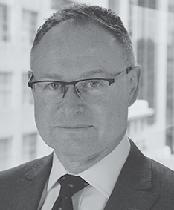
He is a former chief executive of New Zealand’s Financial Markets Authority. Outside of the regulatory sphere, Hughes has held roles including chief risk and legal officer at UniSuper, head of legal at NAB, and group general manager, compliance at ANZ Group.
Hughes will join the Vanguard executive team, bringing a “significant depth of experience in law, governance, regulation, financial services, wealth management and risk into leading this critical function of the business.”
“Following the recent launch of Vanguard
Super and a successful three years since the business introduced Vanguard Personal Investor, a platform for investors to invest directly with Vanguard, we have progressed in our goal of providing Australians, and the advisers that serve them, with a high value offer that supports their financial goals both inside and outside of super,” Vanguard Australia managing director Daniel Shrimski said.
“The strong foundations built by Vanguard’s Australian leadership over the past 27 years has always been guided by delivering on Vanguard’s mission, and with Sean’s appointment we continue to focus on building teams led by strong leaders who will ensure that the business remains aligned with the new and changing needs of our clients into the future, to offer them the best chance of investing success.”
The appointment follows Vanguard being targeted by the regulator late last year over greenwashing concerns. Vanguard was the first investment manager in Australia to be fined for the offence, paying almost $40,000 to comply with three infringement notices related to the PDS’s issued for the Vanguard International Shares Select Exclusions Index Funds. fs
Jamie Williamson
BlackRock Australia is restructuring its fundamental equities business, in a move that’s seen the departure of three portfolio managers.
A spokesperson for BlackRock confirmed it is repositioning the Aussie fundamental equities business following a recent review. The business will maintain a core concentrated portfolio benchmarked to the ASX 300 and the new strategy will account for scale and volatility considerations in the best interest of unitholders, the spokesperson said.
Under the changes, the BlackRock High Conviction Australian Long Short Fund and the BlackRock High Conviction Australian Future Companies Fund will both close.
Meanwhile, the $249 million BlackRock High Conviction Australian Equity Fund will be aligned to Pendal Group’s ‘Focus’ strategy under a new arrangement with the fund manager.
“Existing clients in the fund will benefit from a broader Australian equities exposure, with a similar high-conviction approach, managed by a well-resourced team of 19 investors that have a long-standing performance track record, and received the highest ratings available
from Morningstar, Zenith and Lonsec,” the spokesperson said.
As a result, three of the four portfolio management team members for the High Conviction Australian Equity Fund have left the business. They are Charlie Lanchester, Madeleine Beaumont, and Sam Theodore.
Both Lanchester and Beaumont were hired in May 2015, joining BlackRock as head of Australian fundamental equities and senior portfolio manager, Australian fundamental equities, respectively. Lanchester joined from Perpetual and Beaumont from Andante Capital. Meanwhile, Theodore was appointed to the team in September 2015, recruited from UBS where he was a senior analyst. The BlackRock High Conviction Australian Equity Fund was launched in December that year.
The fund has severely underperformed since its inception. As at 31 December 2022, the fund’s total YTD return was -26.57% against the benchmark - the S&P/ASX300 Industrials Accumulation Ex Top 5 Stocks by Market Cap Gross Index’s – return of -13.99%. Since December 2015, it’s seen a total return of 31.91% versus the benchmark’s 55.54%. fs
Chloe Walker
HSBC Australia has partnered with the Australian Institute of Superannuation Trustees (AIST) as it looks to expand its services in the Australian superannuation sector.
The new partnership will see HSBC and AIST collaborate to help inform the latter’s members of key industry trends and insights that can assist with international mandates, it said.
It will also form an important platform for HSBC as it looks to increase its business with Australian superannuation funds across areas such as custody, FX, real assets, and asset management.
According to the Australian Custodial Services Association, as at June 2022 HSBC ranked seventh in Australia in terms of assets under custody. In the six months to June 2022, its total assets dropped 10.3% to $197 billion.
HSBC head of markets and securities services for Australia and New Zealand Nick Wheeler said that Australian super funds’ increasing focus on offshore investment is the right strategic decision for their members, given the projected size of AUM by the end of the decade.
“Our knowledge of global markets combined with our suite of solutions including global asset management, securities services and access to public and private investments means we’re uniquely placed to assist asset owners and managers on their investments decisions, and we believe AIST is the ideal partner and platform to deliver this insight to the industry,” Wheeler said.
Meanwhile, AIST chief executive Eva Scheerlinck said: “We appreciate the support provided and value added for our member funds across the profit-to-member sector by our partners, particularly by HSBC with its global reach, broad service offering and expertise in offshore markets at a time when our member funds are increasing their global investment.” fs
Praemium has reported a $1.02 billion hit to its net inflows for the half year to December 31, down 53% from the same time last year.
Praemium chief executive Anthony Wamsteker said: “Investor sentiment has been very subdued in the wake of three successive previous quarters of negative markets and high volatility.”
The company said total funds under administration (FUA) were $42.7 billion, up 6% from $40.5 billion in June.
Its platform saw a 7% increase to $20.9 billion from $19.5 billion last June, while Separately Managed Accounts (SMA) increased by 11% to $9.0 billion from $8.1 billion.
“The December quarter of the 2023 financial year has seen both Powerwrap and Praemium’s SMA scheme continue to generate positive net flows,” Wamsteker said.
“The SMA is our cornerstone product and highest revenue earning service. It achieved rolling annual net inflows of $1.3 billion, including $225 million for the quarter. Its rolling annual net funds flow represents 16% of the starting FUA, an outstanding achievement.” fs
01: Andrew Moore chief executive SpaceshipJamie Williamson
Spaceship is cutting costs, informing staff it will reduce the size of its team, while also restructuring its leadership.
The superannuation and investment startup made the announcement on January 17, saying it expects four members of the team to leave the organisation. According to its website, the company employs 45 people. Those impacted were in the product and marketing teams, Spaceship told Financial Standard
Spaceship said the “difficult decision” was made “to accelerate our path to self-sustainability and ensure we are well positioned to navigate the challenges of the current macro environment.”
It added that the changes serve to reduce costs, but the strategy and core business remain unchanged. It also said there would be no impact on products.
“This is not a decision we imagined would be ahead of us when making hiring decisions. We
are deeply grateful for everything these team members have done to help build Spaceship, and this is in no way a reflection on their contributions,” Spaceship chief executive Andrew Moore 01 said.
“We will be making every effort to provide those impacted with the appropriate support.” At the same time, the company said it will restructure its leadership team.
Spaceship chief financial officer Katrina Sly is taking on a broader role, assuming the chief operating officer role as well, while Tim Kildea has been appointed chief risk officer following several years in the risk, compliance, and operations function.
Meanwhile, senior portfolio manager Jason Sedawie has been appointed to the newly created role of vice president of investments.
Per its 2022 annual report, Spaceship Super saw its membership grow 80% last financial year, to more than 18,000. fs
Cassandra Baldini
HUB24 has launched additional ESG ratings on its platform, following a collaboration with Morningstar and Responsible Investment Association Australasia (RIAA).
The new functionality provides advisers with access to “data-driven insights” and reporting metrics for selected managed funds as well as more than 350 Australian-listed securities.
HUB24’s new ESG ratings are made available through Morningstar’s Sustainalytics rating system.
The system ranks selected funds and Australianlisted securities on a scale of risk while also identifying whether a managed fund has been certified by the RIAA.
The platform provider explained as the demand for responsible investing continues, its new capability will support financial advisers in making investment choices based on their client’s individual preferences and ESG risk profile.
“There is a growing demand by consumers for transparency around responsible investments,” said HUB24 managing director and chief executive Andrew Alcock.
“Our role is to provide solutions that enable advisers to support their clients to meet their individual investment preferences.”
Alcock explained HUB24 is in a “unique position” to empower better financial futures for Australians.
“So, offering a broad range of investment options and insights on the HUB24 platform enables advisers to support their clients in making informed investment decisions,” he said.
Morningstar managing director Jamie Wickham added the firm is pleased to make its Sustainalytics data available on the HUB24 platform.
“Each of our methodologies gives advisers better visibility over how Australian listed companies and funds manage ESG,” he explained. RIAA chief executive Simon O’Connor outlined its research revealed 64% of Australian consumers expect financial advisers to be knowledgeable about responsible investment options.

“By making RIAA certification available on the HUB24 platform, advisers can build their knowledge and understanding, easily determining whether a fund has been certified by us and adheres to the strict operational and disclosure practices required to meet our responsible investment standard,” he said.
Earlier in January, HUB24 recorded $2.8 billion of platform net inflows in Q2 FY23, down 23.6% year on year.
The funds platform also saw net inflows of $5.8 billion in 1H FY23, a drop of 13.6% from the previous corresponding period.
In an ASX announcement, HUB24 said its inflows were strong in the context of current market dynamics and macroeconomic events. fs
quote We will be making every effort to provide those impacted with the appropriate support.
There’s an old, oft-repeated adage in investing circles about how time in the market always beats timing the market.
MFS Investment Management says the best example of this can be seen in the performance of small and mid-cap stocks over time. In the 20 years to December 2021, the MSCI ACWI World Small Mid Index saw an annualised return of 9.72%. Over the same period, the MSCI ACWI World Index saw an annualised return of 7.98% and the MSCI World Index returned 8.06%.
While many investors might flee to larger, better known companies in times of uncertainty, institutional portfolio manager Nick Paul believes this is the wrong call. Remember, the Global Financial Crisis and the COVID crash both happened in the last 20 years.
Past performance aside, Paul says there’s several reasons small and mid-cap stocks represent a sound investment in tough macroeconomic environments.
Firstly, Paul says to consider these stocks’ valuations relative to large caps, which are trading at multi-decade lows. This makes small and midcaps an attractive prospect, he notes.
Secondly, Paul says consumer confidence is key – though not in the way one might think.
For context, the OECD’s Consumer Confidence Index surveys consumers on the outlook for their household finances and ability to save, and their sentiment about the economic environment. An indicator above 100 means consumers are feeling positive, while an indicator below 100 is indicative of a more pessimistic outlook. As per the most recent data, global consumer sentiment currently sits at 96.9, while it’s slightly higher –though still low – in Australia at 97.5.
“Historically, if you look at consumer sentiment as a contrarian indicator, it’s a good buy indicator; when consumer sentiment is low, that’s typically a good opportunity to invest in small and mid-cap stocks,” he explains.
Finally, and more importantly, over the last two decades global small and mid-cap stocks have strongly outperformed large stocks, Paul says.
“You really need to be there through market cycles, so it’s less about timing the market versus time in the market,” he says.
However, as with any conversation about going global, discussing an allocation to global small and mids can be challenging when it comes to Australian clients as they’ve historically shown a bias to large cap stocks. Adding to the complexity, Paul says, is the fact that clients often don’t even realise that they’re lacking an allocation to smaller companies.
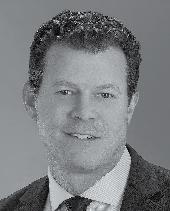
This is because the standard benchmarks have
changed significantly over the past decade, he explains.
“If you went back a decade and looked at the MSCI All Country Index or the MSCI World Index and you looked at the allocation to small and mid-cap stocks, under $30 billion in market cap, you would see that over 40% of those benchmarks actually had an allocation to $30 billion and below,” Paul says.
“Fast forward to today and that allocation has been cut in half.”
Now, a handful of mega-cap US technology companies like Alphabet, Amazon, Apple, Meta and Tesla dominate those benchmarks.
“Whether you knew it or not, a decade ago you had a fair amount of exposure to small and mid-caps, which again has been a very strong performing asset class over time. But today, you just don’t get that allocation in standard benchmarks,” Paul says.
“I think having a dedicated allocation to the asset class today makes a lot of sense, even versus a decade ago.”
These shifting benchmarks have created gaps in investors’ portfolios because, while the indices still include some mid-caps, companies with market capitalisation of over US$300 billion have commandeered much of the historical weighting to smaller stocks; where they once represented less than 2% of the benchmarks, now they account for over 20%.
Paul elaborates: “As standard benchmarks have changed over time and you get less exposure to those $30 billion and belows, that decrease in exposure has not just come from small caps – it’s also come from mids. So, whether they know it or not, investors probably have a gap in their lineup, not just in allocations to small but also to mids.”
Paul adds that an allocation also improves liquidity and increases the maturity and quality characteristics within the portfolio as the companies have typically been around a lot longer.
“By expanding your universe for those reasons, that’s a positive, and it fills that gap for investors with one portfolio as opposed to having to invest in two separate portfolios,” he says.
An allocation also provides obvious diversification benefits, with about 8000 names in the benchmark. However, the sheer size of the asset class means it’s extremely inefficient – but that makes it an ideal space for active managers to play, Paul says.
“The number of names in the asset class is astounding,” he asserts.
“From a sell side research standpoint, a lot of those names are thinly covered.”
As such, MFS has a global research platform and analysts on the ground in almost all the

From
markets its MFS Global New Discovery Trust invests in, meeting with its investee companies.
“We believe the lack of analyst coverage in the small and mid-cap universe brings great opportunities for active managers like MFS,” Paul says.
The MFS Global New Discovery Trust is currently overweight Europe and the UK. It’s not because of any top-down, macro calls though – it’s about valuations.
“If you look back, historically over time as US stocks have become relatively expensive compared to their counterparts in Europe and the UK, we’ve become more underweight the US and more exposed to that area of the market as we’re finding better opportunities,” Paul says.
“From our standpoint, as we try to look across the globe for opportunities, those better opportunities include both underlying fundamentals as well as valuation.”
Paul says the team isn’t focused on making big, top-down calls on sectors or regions. Rather, they like to focus on bottom-up security selection to drive performance over time. That’s what drives both the process, and the alpha MFS is looking to generate over time, he explains. fs
Disclaimer
Equity Trustees Limited (“Equity Trustees”) (ABN 46 004 031 298), AFSL 240975, is the Responsible Entity for the Trusts. Equity Trustees is a subsidiary of EQT Holdings Limited (ABN 22 607 797 615), a publicly listed company on the Australian Securities Exchange (ASX: EQT). MFS International Australia Pty Ltd (“MFS Australia”) (ABN 68 607 579 537), AFSL 485343 is the Investment Manager for the Trust and is regulated by the Australian Securities and Investments Commission. This material has been prepared by MFS Australia to provide you with general information only. In preparing this material, MFS Australia did not take into account the investment objectives, financial situation and particular needs of any particular person. It is not intended to take the place of professional advice and you should not take action on specific issues in reliance on this information. Neither MFS Australia, Equity Trustees nor any of their related parties, their employees or directors, provide any warranty of accuracy or reliability in relation to such information or accepts any liability to any person who relies on it. Investment involves risk. Past performance should not be taken as an indicator of future performance. You should consider the Product Disclosure Statement (“PDS”) before making a decision about whether to invest in this product. The PDS can be obtained by contacting MFS Australia or from www.mfs.com. The Trust’s Target Market Determination is available by visiting www.eqt.com.au/insto. A Target Market Determination is a document which describes who this financial product is likely to be appropriate for (i.e. the target market), and any conditions around how the product can be distributed to investors. It also describes the events or circumstances where Equity Trustees may need to review the Target Market Determination for this financial product. Any securities and/or sectors mentioned herein are for illustration purposes and should not be construed as a recommendation for investment. The information contained herein may not be copied, reproduced or redistributed without the express consent of MFS Australia. While the information is believed to be accurate, it may be subject to change without notice. Except in so far as any liability under any law cannot be excluded, MFS Australia does not accept liability for any inaccuracy or for the investment decisions or any other actions taken by any person on the basis of the material included. MFS Australia does not authorise direct distribution to retail investors. Unless otherwise indicated, logos, product and services names are trademarks of MFS and its affiliates and may be registered in certain countries.
Netwealth said its FUA increased a total of $5.8 billion in the 12 months to December, representing a growth of 10.2%. Funds under management also increased $0.6 billion to $14.4 billion, despite negative market movement.
It saw gross inflows of $4.1 billion for the December quarter, which were partially offset by larger than usual outflows in the high-net-worth investor and mid-market segment.
“A higher proportion than average of the outflows was non-administration fee paying,” it said.
It also reported an increase of 2568 member accounts in the quarter, now sitting at 121,032.
In FY22, Netwealth said it “strategically stepped up our investment in people and technology to further enhance our platform capability and service levels for existing and new clients.”
The impacts of FY22 initiatives, combined with returning to a post-covid business environment has resulted in our expenses increasing in 1H23, it said.
“The uncertain economic environment, coupled with recent changes in financial market sentiment has adversely impacted both the timing of committed transactions and subsequent inflows in 1H2023, and the quantum of outflows for the December quarter ($2 billion) where which proportionally above average due to some HNW and mid-market/institutional account holders partially withdrawing funds,” Netwealth said. fs
A new study from Dimensional Fund Advisors suggests the local advice industry is turning the corner, with high-performing firms in Australia and New Zealand reporting higher average revenue growth.
Now in its 10th year, Dimensional’s study looked at 75 advice firms in Australia and New Zealand, as part of a larger survey by the asset manager of 740 firms globally.
According to the survey, high-performing advice firms in Australia and New Zealand made a 19% year-on-year growth in revenue on average, as opposed to 14% among other local firms.
High performers were also generating more revenue per household at about $8400 versus $7400.
Average revenue per senior adviser was also significantly higher than elsewhere, coming in at $1.1 million versus $750,000.
In addition, higher performing firms were managing to provide a greater number of services to a larger percentage of their clients in areas such as tax, retirement and insurance planning.
Commenting on these findings, Dimensional Australia client group co-head Nathan Krieger said: “Part of the success is coming from improving efficiencies and implementing technology, but also from growing their client service support personnel significantly faster.
“That’s allowing high performing firms to service more clients per adviser without losing quality.”

On average, the survey found that a senior adviser at a high performing firm now services 173 households, as opposed to 122 households at other local firms. fs
During uncertain economic times, offshore investments will provide pockets of opportunity for people to be better leveraged to high-growth areas.
01: Nick Wheeler head of markets and securities services HSBC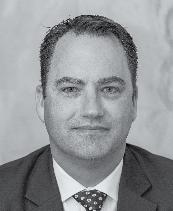
The recent partnership between the Australian Institute of Superannuation Trustees (AIST) and HSBC will help superannuation funds diversify globally, says the latter’s head of markets and securities services Nick Wheeler01
In an interview with Financial Standard , Wheeler said super funds are facing an increasing need for diversification opportunities due to the concentration of risk in Australian public assets, specifically fixed income and equities.
He also cited growing inflows into the sector as a further reason for diversification.
However, they are facing challenges when it comes to diversifying their portfolios globally.
“As super funds seek diversification opportunities, they’ll face challenges in terms of knowledge and insights into local markets, including regulatory and operational risks,” Wheeler said.
“Additionally, liquidity in these markets will be a major concern.”
As recently reported by Financial Standard , HSBC and AIST have partnered to provide insights on industry trends to assist AIST members with international mandates.
The partnership is also expected to bolster HSBC’s business with super funds in areas such as custody, foreign exchange, real assets, and asset management.
HSBC head of global banking, Australia Anita O’Brien commented: “Our partnership with
super funds isn’t a new one, it’s something we’ve been doing for a long period of time and want to continue to do as super funds expand offshore.”
“The partnership with AIST is about building a profile and expanding the brand and the breadths that we have across those super funds.”
Super funds are increasingly turning to offshore investment opportunities to generate attractive returns and diversify their assets. Evidently, APRA data shows than funds hold 45% of investments offshore, up from 30% a decade ago.
As the mandatory Superannuation Guarantee rate is set to increase to 12% by 2025, Wheeler anticipates that this trend toward internationalisation will accelerate.
Offshore investments can offer several advantages for super funds and their members, Wheeler said.
Firstly, the ability to diversify the portfolio and access a wider range of asset classes, providing a more balanced investment strategy.
Investing offshore can also provide access to fixed income, equities, real estate, infrastructure, and alternative assets which aren’t available domestically, providing more opportunities for funds.
“During uncertain economic times, offshore investments will provide pockets of opportunity for people to be better leveraged to high-growth areas,” Wheeler said. fs
According to the Paraplanner Hub and Tanngo’s Australian Paraplanner Survey 2022, less and less paraplanners (80%) are wanting to become financial advisers.
Paraplanners don’t want to move into advising because they don’t want to be in client facing or sales roles, preferring “number crunching,” or simply enjoy the work/life balance of paraplanning, the survey said. Last year, only 72% said the same.
Others paraplanners cited a lack of desire to obtain additional education at a late stage of their career.
“I have never had the desire to be an adviser – it just isn’t for me,” one respondent said.
“I prefer the technical side of financial planning and get more satisfaction from writing high quality advice documents than I do working directly with clients,” said another.
As most paraplanners don’t want to become advisers, it’s understandable they haven’t registered themselves on ASIC’s Financial Advisers Register (FAR), the survey stated, meaning they aren’t legally required to complete any formal training or ongoing professional development.
Since last year, the number of paraplanners registered has dropped from 21% to 12%.
Moreover, 50% of paraplanners who do the “number crunching and technical calculations” don’t maintain 40 CPD points. Research shows that 80% of these paraplanners don’t keep track or simply do no ongoing development.
“As an industry, are we comfortable knowing that the people developing and modelling advice strategies and assisting with research aren’t required to adhere to ongoing development standards,” the survey said.
Last year’s survey results showed that 75% of paraplanners would like to see a professional education standard mandated and 88% of paraplanners think that they should be required to maintain a level of ongoing professional development/education.
Speaking with Financial Standard, Padua Solutions head of technical advice Rudy Haddad said: “Paraplanners play a key role in the formulation and delivery of financial advice. They are instrumental in providing product research and strategy modelling options for the financial planner, not to mention producing the full financial plan and ensuring it meets the client’s goals, objectives, and financial needs.”
“Hence, it’s vital their skills are maintained and remain relevant.
“Quality paraplanners act as a ‘check and balance’ during each stage of the advice process and the engagement between the financial planner and the client. They provide added value in the areas of licensee standards, regulatory compliance and technical competency.
He said legally obligating CPD for paraplanners makes sense, as it would ensure a higher overall quality of advice across the paraplanning community. fs


Jamie WIlliamson
An Australian family office is investing $200 million in the Regal Private Credit Opportunities Fund, with the potential for a further $100 million down the line.
Regal said the mandate, from a “prominent” family office, has significantly accelerated the funds under management and the growth profile of the strategy.
The fund was launched in October last year, focused on senior loans to small and mediumsized public and private companies in Australia and New Zealand, along with asset-backed loans and other credit opportunities.
“We are seeing increasing interest in private credit from Australian family offices, high net worth individuals and institutions as investors search for ways to diversify their alternatives exposure,” Regal chief executive Brendan O’Connor said.
“With a strong track record in pre-IPO and emerging companies investments, Regal has emerged as one of Australia’s largest providers of capital to Australian private companies over the past five years. Regal can now work with companies on their financing needs through equity or debt.
“Regal is uniquely placed to analyse the private credit deal opportunities other capital market participants may see as too complex, drawing on Regal’s large fundamental and sectorspecific investment team and independent risk management capability.”
Regal said it sees the private credit market as a rapidly evolving, increasingly sophisticated space. fs
Cassandra Baldini
ASIC has banned a Gold Coast director from providing financial services for four years after discovering his business leased an algorithmic trading program and operated without a licence.
Gregory William Finerty, the sole director of Bradford AI, has been handed down the penalty following the hiring of an automated trading robot, designed to work on foreign exchange (FX) trading platforms.
Bradford AI leased “Robot 1” to trade on the FX market, using an Australia-based over-the-counter contracts for difference (CFD) broker.
Further, the regulator said Finerty carried on a financial services business without an Australian financial services licence and engaged in misleading and deceptive conduct.
ASIC said between January 2020 to roughly the end of December 2021, Finerty dealt in financial products without a licence by arranging for his clients to acquire and dispose of financial products, being foreign currency CFDs.
It also found Finerty misled clients about the performance of Robot 1 and directed or assisted clients to mislead the CFD broker about their trading experience.
The regulator determined Finerty is not a fit and proper person to provide financial services, is not adequately trained or competent to provide financial services and is likely to contravene financial services law. fs
01: Blake Briggs chief executive Financial Services Council
Andrew McKean
Financial Services Council (FSC) research found Australians support legislating an objective for super that focuses on delivering retirement income.
A focus group study conducted by CT Group revealed Australian consumers’ awareness, understanding, beliefs and attitudes towards the objective of superannuation.
Participants agreed that legislating an objective for super, with a focus on delivering income in retirement, would benefit Australians. They also expressed the desire for more control over where and how their money is invested.
Participants also preferred the objective of superannuation wording to be specific to achieving a certain standard of living in retirement.
FSC chief executive Blake Briggs 01 said Australians share a strong belief that the superannuation system should be designed with
a singular focus on their retirement.
“Despite there not being a legislated objective of superannuation to date, Australians know what their superannuation is for and do not believe legislating an objective should open the door to political objectives, such as investing in nation building infrastructure, he said.”
“With an additional three million Australians retiring over the next decade, outcomes from the government’s consultation on the objective of the superannuation system must reflect the expectations of everyday Australians.”
Briggs continued stating that the government should seize the opportunity to move ahead on a simple definition that can be commonly understood by all Australians and that the super industry is unified on.
“An enshrined objective for superannuation would lead to more stability in policy settings and end the cycle of constant tinkering which undermines confidence in the system.” fs
Intermodal Terminal Company (ITC), fully owned by Aware Super, plans to build and operate a $400 million terminal to unlock Australia’s supply chain.
The planned terminal in Melbourne’s north, set to be completed in 2025, will be Australia’s largest intermodal terminal.
ITC founder and chief executive Mishkel Maharaj said: “ITC is delighted to announce the Somerton Intermodal Terminal (SIT) as the first independently constructed, maintained, and operated terminal in our portfolio.”
“We welcome all participants in Australia’s supply chain to benefit from the strategic capacity this asset will introduce into the nation’s supply chain network.”
Further, the terminal will bring significant benefits such as lower carbon emissions and air pollution, reduced traffic congestion, and improved road safety, he added.
SIT will process over one million Twenty-foot Equivalent Units (TEU) annually, reducing truck trips on Melbourne roads by 500,000, saving 451 million litres of fuel, and reducing carbon emissions by 189,000 tonnes, ITC said.
SIT will provide a cost-effective and efficient solution to maximise the utilisation of the $14.5 billion Inland Rail project. It will also be a key node in the state and federal government’s Port
Rail Shuttle Network connecting cargo from the Port of Melbourne, ITC added.
Aware Super associate portfolio manager infrastructure and real assets, and ITC director Krish Gandy commented: “Platform companies like ITC are a great example of how Aware Super is actively investing to help deliver strong, risk-adjusted returns over the long term on behalf of our members.”
“We’re extremely pleased ITC has announced its first project, the Somerton Intermodal Terminal in Victoria, as we believe it will become a vitally important strategic asset for Melbourne as well as enabling the nation to benefit from an open and competitive rail freight network.”
ITC is a new investment platform launched in December 2022, backed by Aware Super.
Aware Super said it unveiled ITC to deliver strong risk adjusted returns for members through sourcing new investment opportunities and innovative investing strategies.
The location for the terminal is currently home to Kraft/Linfox and Coles warehouses, a Boral concrete batching plant and Labelmakers Group offices and warehouse.
Coleman Rail has been appointed as principal contractor to construct the facility. fs
Despite there not being a legislated objective of superannuation to date, Australians know what their superannuation is for...01: Jenneke Mills head of technical services


Legislation was recently passed extending the opportunity to make a downsizer contribution to individuals aged 55 or over. This change came into effect on 1 January 2023.
This provides a great opportunity for eligible clients to boost their super by up to $300,000 per person in a one-off contribution. Here are some tips and traps to consider before recommending a downsizer contribution.

It is important to remember while making a downsizer contribution may be appealing at younger ages and could provide other benefits which are outlined below, it is important to ensure preservation age isn’t an issue before recommending clients to make a downsizer contribution to their superannuation.
A property doesn’t need to be the main residence for the full ownership period or at the time of sale to qualify for a downsizer contribution. Provided the person making the contribution is eligible for at least a partial main residence capital gains tax (CGT) exemption (different rules apply for couples), there may be an opportunity to make a downsizer contribution. However - is a downsizer contribution always best in this scenario?
There may be an opportunity to maximise social security entitlements when selling a property that qualifies for a downsizer contribution, by:
• Retaining downsizer contributions in an accumulation account, where the person (or their partner) is under their Age Pension age, or
• Contributing proceeds of sale to super, where a person is a pension recipient and intends to use a portion of the sale proceeds on a new main residence but may be eligible for a means-test exemption or concession for up to 24 months.
It is important to consider how a contributions strategy to maximise social security entitlements fits in to the client’s broader objectives.
It is important to consider the impact on future contribution eligibility. This may arise where a client’s circumstances indicate they may benefit from making a large personal deductible contribution (PDC) in a future year (e.g., a
plan to sell an investment property). Where making a downsizer contribution today will push TSB above the limit for catch-up concessional contributions (CCs), thought should be given to whether or not it is better to:
• Forego the downsizer contribution today, to maintain eligibility to make the future PDC, and
• To then consider making a non-concessional contribution (NCC) with the sale proceeds afterwards.
This will also depend on what other capital the person may have available that they wish to contribute under the NCC caps, and the net benefit of delaying the contribution.
Where the property being sold was not the main residence for the full ownership period and a capital gain is realised, a PDC could help to manage CGT. If a person is eligible to make a catch-up CC, this could facilitate a large PDC. However, a deduction cannot be claimed for a downsizer contribution. Therefore, there is a strategic opportunity to consider the most effective way to contribute proceeds to super.
If the person intends to sell multiple qualifying dwellings, it may be beneficial to consider:



• Utilising the NCC cap and CC cap if applicable, to contribute sale proceeds, and







• Preserving the downsizer contribution opportunity for the disposal of another qualifying dwelling, where the person might otherwise be ineligible to make other contributions based on age or TSB.

As there is no upper age limit, older clients (or even with an Enduring Power of Attorney (EPOA)) could consider downsizer contributions. Before making recommendations, it is important to consider:
• The person’s family circumstances and estate planning objectives
It is important to consider how a contributions strategy to maximise social security entitlements fits in to the client’s broader objectives.
• Whether beneficiary nominations need to be updated (or whether they can be updated if advising an EPOA), and

• Where an existing beneficiary nomination cannot be updated (due to the trust deed, specific provisions of the EPOA or state/ territory-based legislation), whether a downsizer contribution is appropriate.
Timing and notification requirements exist for eligible downsizer contributions.
Where any requirements are not met, the contribution is treated as a personal contribution. The fund can only reject a personal contribution where the person has made the contribution more than 28 days after the end of the month they turned the age of 75. This means in all other circumstances, the contribution is re-reported to the ATO as a personal contribution, and the person (depending on their circumstances) may have an excess NCC.
1. For properties sold pre-1 January 2023, an assets test exemption may be available for up to 12 months on a portion of the proceeds, or up to 24 months if sold on or after 1 January 2023 (and an income test concession also applies).
2. $500,000, measured at 30 June prior to making the contribution. fs
Implementing an artificial intelligence solution has saved Insignia Financial tens of thousands of working hours, it says.
The financial services company rolled out its first digital worker called Optimus in 2019 and has since steadily increased its digital workforce.
It explained over 60 processes are currently being automated, reducing costs and improving business efficiencies, saving on average 15,000 full time employee hours per month.
The intelligent software bots, known as digital workers, automate processes to achieve efficiencies across various Insignia business units, ranging from finance to operations and human resources.
For example, Optimus updates Insignia’s superannuation rollover information into the its registry systems, freeing up the time of several employees, Insignia said.
“Intelligent automation has provided the equivalent of 100 plus full-time workers at onetenth of the human cost,” it explained.
To make it happen, Insignia partnered with Automation Anywhere to deploy digital workers powered by the Automation Success Platform. Insignia chief operating and technology officer Frank Lombardo said automation has enabled competitive advantages by freeing up people and allowing them to continue supporting clients and dedicating time to other value-added work.
“Previously the paraplanning team would update client details on a PDF that would be distributed to clients, now a bot automatically completes and forwards the required forms to clients, with the error rate dropping to near zero,” he explained. fs
Melbourne’s Grollo family has acquired Mt Hotham airport in Northern Victoria for over $6 million.
Constructed in 1999 at an elevation of 4300 feet, Mt Hotham is the highest commercial airport in Australia, located a short drive from both the Mt Hotham ski fields at nearby Dinner Plain alpine village.
International ski resort group Vail Resorts previously owned the airport but decided to list it in November last year with prominent Melbourne real estate firm Castran.
“We started an EOI program in November, which ran for five weeks, and we had 110 respondents to the EOI program,” managing director John Castran told Financial Standard.
“On the first cut of offers we had eight people that were interested in buying it, and then on the final cut we had two parties that had signed enforceable contracts (subject to the vendors acceptance), and one party won that- and that was Grollo Group.”
Castran said that it was important from the vendor’s point of view that the successor would be a group that is experienced in development, particularly Alpine development, and that understood what it was like to develop property in environmentally sensitive areas.
“The Grollo family already own Mt Buller ski resort and they’ve carried out at least $100 million worth of development over the last four or five years,” Castran said. fs
Chloe
Pella Funds Management’s offering is gaining traction abroad, with the Sydney-based firm launching a UCITS fund in Europe.
Pella has launched the Pella Global Securities Sustainable Fund, domiciled in Luxembourg. It applies the same strategy as its Global Generations Fund run locally, founded by chair and chief investment officer Jordan Cvetanovski01 in 2005.
Cvetanovski said his experience in managing investments in Europe gives him the advantage of understanding how the strategy would benefit European investors.
In launching the product, Pella partnered with Universal Investment and CAPinside.
Pella is Universal Investment’s first Australian asset manager to be added to its platform.
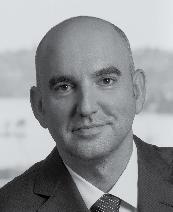
“We are incredibly pleased with our choice in partners because we know the importance of having passionate people who share the same vision. Universal Investment and CAPinside are
market leaders and I am confident that their distribution and administration capabilities combined with Pella’s proven investment process will result in the Pella Global Securities Sustainable Fund achieving remarkable success,” Cvetanovski said.
Universal Investment director of sales Dirk Grossham congratulated Pella on the launch.
“We are looking forward to a long term and successful partnership. Thank you for your trust and all your efforts in jointly setting up the fund,” he said.
Likewise, CAPinside chief sales officer Alexander Krebs said: “On behalf of CAPinside, I am excited to introduce Pella Funds Management to the German market and add an opportunity to German investors with an exciting global ESG investment strategy.”
“The passionate approach of Jordan Cvetanovski and his team will definitely excite the German investment community.” fs
Chloe Walker
In another classic case of “she’ll be right, mate”, Australian investors are far less concerned about the current market volatility than our global counterparts, according to new research by State Street Global Advisors.
The ETF Impact Investment Survey, which was conducted by the firm in November and December last year, studied over 1000 investors globally, including 300 respondents from Australia, Japan, and Singapore.
It found that while 75% of Australians believe volatility in the stock market will continue in 2023, we aren’t too stressed by that uncertainty (23% vs 44% globally), believing it creates buying opportunities (76% vs 68% globally).
In addition, the report stated that Aussies are overwhelmingly optimistic about their financial future over the next 12 months (78%), compared with only 15% being pessimistic.
“This indicates the remarkable resilience in the Australian economy after three years of economic and social dislocation caused by the global pandemic,” State Street Global Advisors head of SPDR distribution in Asia Pacific Meaghan Victor said.
In addition, Victor said that more than half of Australian investors plan to maintain their longterm investment strategy in 2023, compared to a minority of global investors.
“A further one in six (16%) of Australians are
investing more in 2023, looking for value,” she said.
“This suggests Australians are more comfortable with their current investment settings than those overseas.”
When it comes to ETFs, 70% of Australian investors reported that having them has improved the overall performance of their portfolio.
However, regardless of whether they own ETFs in their portfolio, more than half of investors globally agreed ETFs are an investor-friendly investment product (58%), while only 46% of Australians believed so.
Overall, more than half of global investors believe ETFs offer more liquidity to respond rapidly to market changes (52%), compared to only 36% of Australian investors.
“With 2023 offering a potentially turbulent financial outlook, 51% of global investors believe ETFs can mitigate risk better in volatile markets compared to other investments, compared to 34% of respondents in Australia,” Victor said.
Victor added that globally, Millennials have the most positive attitude about ETFs.
“Four out of five Millennials indicate ETFs have improved the overall performance of their portfolio, versus 73% of Gen X and 48% of Boomers,” she said.
“Millennials are also the most likely to agree that ETFs provide more liquidity during market volatility at 70%, versus 47% of Gen X and 25% of Boomers.” fs
Bhanu Singh has taken over from Glenn Crane as Dimensional Fund Advisors chief executive as part of a long-planned generational change in leadership.
Singh, a long-time senior investment professional at the systematic investor, will remain head of Asia Pacific portfolio management. He brings 20 years of experience with Dimensional to the role, including more than 10 years in the Australian office.
As well as his portfolio management role, he works closely with the investment team to help design and implement custom solutions.
Crane set up the business in Australia in 1994 and will continue as executive chair.
AZ Next Generation Advisory (AZ NGA) has appointed Dan Heckendorf as its new chief financial officer as it plans its next growth phase.
Heckendorf, who will report to AZ NGA chief executive Paul Barrett, joined in October as interim chief financial officer.
A spokesperson told Financial Standard that the role was previously outsourced, however due to the firm’s current size and scale it was the right time to secure in-house talent.
Heckendorf was previously at Pepper Money. He has also served as senior commercial finance manager at Westpac Banking Corporation and held senior roles at Deutsche Bank and the Royal Bank of Scotland in the United Kingdom.

Barrett said Heckendorf is the ideal person to lead AZ NGA’s finance team and partner with the board and management to execute the group’s strategic vision to build a leading professional services business.
Vien Luong and Tracy Southern have both joined the Mason Stevens team, Luong from KCA Business Consulting and Southern from FNZ Group.
Luong has worked with Mason Stevens once before. From 2010 to 2017 he held roles including head of portfolio services and technology manager. He’s also previously worked for Next Financial, Wilsons HTM, Broadridge and Creativemass.
In the new role, he will lead the continued development and enhancement of the platform’s technology to ensure it continues to meet financial advisers’ needs.
Meanwhile, Southern will drive the technology strategy and objectives, leading the infrastructure, development, and technology project teams.
Southern managed the NAB WealthTrade while at FNZ Group. Prior she worked for the New South Wales government, first for Venues NSW, then with the Office of Sport and the Department of Customer Service. She also previously worked in management roles at Wyong Shire Council on the NSW Central Coast, and the Central Coast Mariners Football Club. fs

The head of Australian equities at abrdn, Michelle Lopez, has left to pursue other interests, according to the asset manager.
Lopez ran the local equities team for nearly four years after being promoted from deputy head in 2019.
Joining abrdn in 2004, she worked as an investment analyst before moving up to investment director.

Before joining the asset manager, she worked in Willis Towers Watson’s multi-asset team.
“Natalie Tam, deputy head of Australian equities, will oversee the team in the interim, following Michelle’s departure,” abdrn said.
Commenting on her time at abrdn, Lopez said: “It’s been one of tremendous opportunity too. Opportunities to learn from some of the most brilliant minds in the industry both internally and externally and to travel and experience different cultures and management styles.”
Former APRA chair Geoff Summerhayes has been appointed as chair of Zurich Financial Services Australia.
Summerhayes boasts an impressive track record in financial services as former executive board member of APRA and as chief executive of Suncorp Life.
He was also regional general manager at National Australia Bank (NAB) and chief executive of MLC Superannuation and Investments.
Summerhayes’ new role will also see him chair Zurich’s other related corporate entities, having already served as an independent non-executive director on each of these boards since January last year.
Summerhayes said he was delighted and honoured to take on the new role.
Former Countplus chief executive Matthew Rowe is now chair of the firm’s advisory board. Rowe has been working with the company for several months now, with Kofkin Bond & Co confirming the appointment in late January.
“As Kofkin Bond & Co continually expands as a multi-faceted and diverse financial services and consulting company, having someone of Matthew’s caliber to help ‘steer the ship’ will be integral to our growth,” the company said.
Rowe was chief executive and managing director of Countplus for five years to February 2022. His departure from the role was sudden, coming just three months after having been reappointed. Of note, during his time in the role, he oversaw the acquisition of Count Financial from Commonwealth Bank.

High-profile investment and asset management executive Kate Hillyar has joined HMC Capital as it continues to grow its institutional alternative funds management business.
Before joining the alternatives investment firm, Hillyar worked in London in similar roles at abrdn and most recently Federated Hermes.
She was was previously a director of institutional distribution and an investment specialist at MLC Investment Management.
Earlier, she worked at NAB Asset Management as a director of institutional distribution and an investment specialist and was the Western Australia business development manager for NGS Super.
She has also held roles at Macquarie and Credit Suisse Asset Management.
Platform evolution seems infinite. Following decades of technological advancements and new entrants, financial advisers have endless choice. Today, the market’s priority remains automation and consolidation, which is promised to once again transform the space. Cassandra Baldini reports.

Platforms have changed significantly over the past 25 years, developing with time, through technology and propped up by an increase in funds under advice (FUA).
Rainmaker Information data shows that, in Australia alone, as of June 2022, total platform FUA sat at $800 billion, up from $602 billion in 2017.
It confirmed assets jumped 33% over the last five years in monetary value. That translates to $197 billion.
In pure numerical terms, retail superannuation represents the bulk of this growth, up 30% in 2022 to $606 billion from $465 billon.
Investor directed portfolio services including wraps have outpaced this in percentage terms, having grown 41% over the same five years, albeit just to $193 billion from $137 billion.
It’s said financial advice is personal, and at the heart of the practice, the client. However, in the platform universe, sitting at the centre of its galaxy is the financial adviser.
“I wasn’t a huge fan of platforms when they first came out because they were very expensive,” explains wealthadvice principal and financial planner Marisa Broome 01
“They offered a lot of benefits for the client in terms of consolidated reporting but due to the expense, you really had to make sure the portfolio was performing because you had an extra cost to cover.”
Hailing back to a time before platforms, Broome reflects on the use of master trusts.
“There was still a concept of a platform out there, but it was just set up in a different way,” she says.
“Master trusts had a different legal structure, you could dial in and get information, but it wasn’t as real time accurate as we have now, where you can trade.”
She says the advancements are simply coinciding with the upgrades in technology that are born through time.
“It’s just the technology,” she says.
“But the actual legal structure attached to platforms is also now more flexible.”
Broome explains the same safety and protections remain in place; however, the structure is now better for the client who can realise their own capital gain.
“Buy-sell costs are cheaper, everything about them is better and it’s a reflection of both demand, the money that they’ve got under advice, competition, and the technological development,” she says.
Perspective Financial Services managing director and financial adviser Esther Althaus 02 also remembers a time, pre-platform. She says nowadays advisers are spoilt for choice.
“Platforms are your one-stop mall for your investment shopping,” she says.
“You drive to one mall where you have a full range of shopping options from high end to low end and from shops selling one type of product like single assets to multi-managers.
“You don’t need to drive all around town, park in various places, deal with traffic and waste time.”
Platforms also cost less these days, Broome says.
“The platform space has become a lot more competitive, so prices have come right down. Now there is actually a lot more benefit attached to using a platform,” she says.
It’s no doubt advancements have changed the market since master trusts handed the baton over to wraps and wraps to separately managed accounts (SMA).
As we kick off the new year and artificial intelligence (AI) continues to be rapidly embedded across the financial services industry it seems the technological possibilities span to infinity and beyond.
The question is, what does it mean for the platform market?
“Digital engagement, and automation, that’s a big focus of most practices at the moment,” explains Praemium chief distribution officer
MartinMorris 03
“There will also be an increased focus on high-net-worths. You’re seeing a lot of the challenger platforms focusing on how they tap into the high-net-worth market.
“Governance is also increasingly important, so that is the quality of investments on the platform, the way they’ve been managed, the size of the APL that’s available. And best interest duty is driving that.”
Morris says ESG is currently playing a really big role in the platform universe, which is in turn driving innovation.
“Everyone’s looking at introducing tools to help customisation at a portfolio level to align with the ESG considerations of the investor,” he explains.
However, he says there is one thing overshadowing all of this.
“One of the biggest challenges moving forward is the connectivity requirement of platforms,” Morris notes.
Historically, platforms have been the central source of truth.
“What you’re seeing now is APIs and connectivity with other technology stacks within the business becoming quite prevalent, platforms that can’t send or receive data from different partners in the tech stack of an advice business are going to struggle,” he warns.
Connectivity and frictionless flow of data within adviser businesses is going to be a critical piece, agrees Macquarie BFS head of wealth product and technology Michelle Weber04


“The future is really about productivity and personalised adviser and client experiences,” she says.

“We’re supporting that through really integrating into the adviser’s ecosystem through open architecture, and our cloud-based infrastructure. That really allows advisers to deliver their tailored client proposition efficiently.”
Like Morris, she concurs that going forward, platforms will need to be both seamless and an intuitive service to compete in the current market. She explains being cloud-based is a key enabler allowing Macquarie to do just that.
“There are so many benefits that come from it,” she says.
Martin Morris“It provides increased resilience, scalability and security and means that we can continue to connect effectively with other software providers, but also creates an ability to deliver new capabilities quicker.”
On the other hand, Insignia Financial chief distribution officer Mark Oliver05 highlights a few more advances that he believes will be key in 2023.

“Another theme I think that’s really coming through in my mind is around retirement,” he says.
According to Rainmaker Information’s Wholesale Advantage Report, the fastestgrowing platform products in percentage terms during last year’s June quarter were Smartsave Super & Pension, AMP Signature Super & Pension, Allan Gray Pension and Raiz Invest Super.
One of the biggest challenges moving forward is the connectivity requirement of platforms.
Advice businesses should be made more efficient with technology.
As your advice firm grows, efficiency and flexibility will be important to successfully scaling your business for tomorrow’s investors.
Flexible enough to handle any investor.
We’ve customised our market-leading, institutional-grade technology platform to cater to all advice businesses models, all clients, all custodial and non-custodial investments and all forms of managed accounts, for both superannuation and non-superannuation portfolios.
Praemium’s market-leading platform allows you to deliver tailored solutions for evolving client needs including intergenerational wealth transfer considerations, total wealth reporting and ESG investing preferences with comprehensive, accurate and engaging reporting to enhance the adviser-client relationship.
Unparalleled efficiency
As a technology led company, we’ve built our entire solution so that it works for whatever stage or size your business is at. There’s no patchwork quilt of borrowed tech that doesn’t integrate properly. Praemium is also the established leader in private wealth solutions and managed accounts so the very same platform can effortlessly scale to meet the needs of high-net-worth individuals to accumulators just starting out on their wealth creation journey.

Unique features.
Being masters of our own tech enables Praemium to offer features that are unique. Like our ESG screening. Our unmatched ability to manage and report on virtually every investment or asset class. Our total wealth reporting and corporate actions and tax management built on historical CGT data dating back to 1987. Our digital acceptance and engagement tools.
So, if you are getting a little tired, not to mention embarrassed, with having to say “we don’t offer that” and frustrated with manual handling of multiple systems and the inability to offer your clients something truly unique, then give Praemium a call. We can help you build your ideal advice business.
Find out more at praemium.com
Unlimit your business potential.

He says: “How do you serve an Australians’ financial wellbeing needs up to and into retirement?”

“At Insignia Financial, we have a through-life proposition, sourcing clients from workplace super, from advisers and from Australians who may once have come to us through a workplace arrangement or through a financial adviser, are doing it themselves and they are focused on retirement now.”
Insignia currently manages about $45 billion of pension assets for Australians.
“The retirement theme is coming through because Australians are living longer, building their super balances and APRA is focusing through the Retirement Income Covenant on meeting Australians retirement needs, not just their accumulation needs,” he says.
Another theme to watch, Oliver says, is re-platforming for advisers.
“If you think of it from a platform provider’s perspective, there are a number that operate on early generation technology,” he says.
Drawing on his observations of the sector, Oliver says advisers are changing their value proposition.
“Advisers are focusing on segmenting their clients better. Some of the themes coming from that include more automation around portfolio construction,” he says.
“Advisers are increasingly outsourcing portfolio construction – how do they build and manage an investment portfolio for their clients that meets their specific goals?
“Really the advice industry is transitioning from being a paper-based implementation of investment models to much more straight through or outsourced.”
He explains this is happening in two main areas; “One is outsourced investment management through a multi manager approach and that’s where Expand Essential plays very strongly and secondly in managed accounts where Expand Extra will deliver SMAs and managed accounts very effectively to that thematic.”
Taking all of this into consideration, Morris explains there isn’t one silver bullet solution when evaluating how to stay relevant in the platform game.
“This is a very tumultuous market. Over the last 23 years in Australia, we’ve gone through the Global Financial Crisis (GFC), Future of Financial Advice (FOFA), the Financial Stability Review (FSR) and the Royal Commission – all of these have outcomes that technology needs to answer,” Morris says.
“Platforms that are nimbler, more modern are the ones that have been able to adapt and answer those pressures a lot quicker than the traditional platform.”
According to Rainmaker Information, managed accounts have played a big part in platform growth. In fact, one could go as far as to say they’re the only aspect of the platform market that is growing.
Data reveals that over the past five years managed accounts have grown 46% per annum whereas nonmanaged account platforms have only grown 1%.
Put another way, Rainmaker says managed accounts are the only platforms showing tangible growth.
“Managed accounts might be a small part of the platform space, but they are a huge share of where the growth is coming from,” says Rainmaker Information executive director of research Alex Dunnin 08
Oliver agrees, adding that managed accounts will continue to play a really important role in the space of differentiated portfolio construction.
“What I’m observing is something I would call a bifurcation of the platform market,” he says.
Oliver highlights the difference between “full-service” wrap platforms that provide an extensive choice of investments, including managed accounts, term deposits, managed investment schemes, and simpler options.
“Equally we’re seeing strong growth in the simplified end so diversified investments that perhaps look a bit more like a MySuper, that are a one-stop-shop, very simple, highly transparent, but don’t have the complexities and costs of managed accounts,” he says.
BT chief strategy and product officer Kathy Vincent 06 explains the wealth manager offers advisers access to a broad range of managed account solutions, designed to suit their business model, investment process and client needs.
Much of the growth experienced by BT Panorama is on the managed accounts front, Vincent says.
“A total of 26% or 1567 of the 6000 advisers active on the platform are now using managed accounts and we saw a 17% rise in the 12 months to November 2022,” she says.
More than 70 new portfolios were added to the platform in 2022, meaning there are now over 290 managed portfolio options available on BT Panorama, with even more growth expected in 2023.
Through the lens of an adviser both Broome and Althaus agree the platform market is heavily weighted on managed accounts.
“There is a growing dependency and that makes sense because it becomes efficient in your practice if all your clients are in that managed account relationship through a platform –you’ve got great efficiencies about what services you can deliver to your clients,” Broome says.
Morris echoes the sentiment but adds that a lot of money moved away from traditional platforms, mainly due to technology benefits, and managed accounts were just a part of that from an investment solution.
“There was also a bigger picture,” he says.
“People moved because of lower prices, better trading outcomes, better reporting, better online tools, more digital automation, the older platforms had just got slow.”
On the other hand, Dunnin explains what needs to be noted is the distinction between traditional platforms and the rest.
“That’s the key to all this,” he says.
“It gets murky because trading systems are platforms too. So maybe the caper is that investors don’t want lists of pre-packaged managed funds anymore, or we need to be more expansive in what we mean by a platform in the first place.”
A new report by NextWealth titled The Great Platform Shake-Out found that a third of large financial advice firms in the UK will become platform operators in the next three years.
It said vertically integrated investment advisers and private equity-backed acquirers are most likely to build and run their own platforms within this timeframe.
NextWealth further reported that existing third-party platform providers are responding by developing modern digital propositions to support white labeled products and additional bolt-on services and dubbed platforms.
NextWealth managing director Heather Hopkins 07 explains that market competition is particularly fierce in the UK.
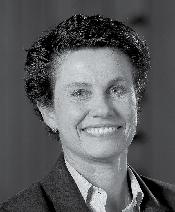

“Incumbent players are being pressured to modernise and evolve their propositions to suit a pressing need for flexibility and digitisation,” she says.
“Particular pressure is being felt from the adviser segment; these firms represent 20% of the existing adviser market but are growing rapidly through private equity backed acquisition.”
While NextWealth expects a third of these larger firms to adopt the adviser-as-platform model, it believes they will maintain a multi-platform strategy to support a wide range of customer needs.
“The number of new clients has slowed, freeing up resources to focus on tech and operations,” Hopkins says.
The question for us here at home is, could this trend occur in our own backyard? Morris thinks not.
“We previously had a significant badged PDS environment but over the last five years that’s really dropped away in terms of firms asking for white labelling,” he says.
“There are two ways to white label. There’s white labelling of a product and then there’s white labelling of an underlying technology.”
He explains in the UK a few large providers supply the base technology to run a platform.
“The provider who is buying in the outsourced technology is then building their own functionality, so the underlying core platform is the same but actually the point of difference is the client engagement experience or reporting,” Morris says.
Another reason he highlights is simple – the UK is a bigger market.
“There are more advisers, more investors, and more wealth,” he says.
“Australia is limited by its size, you may see some players, but you don’t see many new advice firms of significant enough size to truly build product.”
Oliver agrees it’s hard to compare our local scale with some of our global counterparts.
markets have substantially larger pop -
Managed accounts might be a small part of the platform space, but they are a huge share of where the growth is coming from.
Alex Dunnin“Other 04: Michelle Weber head of wealth product and technology Macquarie BFS 05: Mark Oliver chief distribution officer Insignia Financial 06: Kathy Vincent chief strategy and product officer BT
ulations; therefore scale is more readily achievable. Australia is still a relatively small population on a large landmass,” he says.
The Australian market is no stranger to building scale through consolidation and AFSLs such as Diverger, Escala, Koda Capital, and WT Financial are perfect examples of growth following multiple acquisitions.
Meanwhile, Perpetual is an example of a scalable advice firm building out its own wrap platform which has gained significant adviser market share.
A spokesperson for Perpetual explains the firm has a longstanding partnership with Macquarie’s wrap platform services which dates back to 2013.
“Under the arrangement, Perpetual Private and Macquarie have built a platform which uses Macquarie’s existing wrap platform technology and administration services, but has been tailored to include additional features and services to meet the specific needs of Perpetual Private’s advised clients or beneficiaries,” they explained.
“Ensuring our clients have access to the products and services that meet their evolving needs is a continual focus across the business. Perpetual Private’s capacity to both leverage any enhancements Macquarie makes to the wrap platform, as well as build out our own specific features and services, is a great value-add for our clients.”
However, it’s not a trend likely to be echoed amongst smaller boutique firms, with Broome flagging that many advisers aren’t in favour of white-labelling of any kind.
“Most advisers aren’t really comfortable being linked to the product,” says Broome.

“So yes, we have seen that here, a lot of Australian dealer groups are doing that. But at the end of the day, I’m a financial planner and that means I focus on getting the strategy right; product is just one of the answers to getting that strategy right.”
Regulation stands as another barrier, Morris flags.
“What you’re also seeing is with compliance, governance and conflicts of interest, the pressure we’ve gone through with the Royal Commission and therefore it actually restricts a lot of that type of development activity,” he says.
“Equally a question would be, ‘Yes you can do it but where do you add value in the piece, are you an advice firm or a tech business?”
Possible changes to Australia’s weighty regulation are around the bend with the long-awaited Quality of Advice Review (QAR) final proposals.
Currently, ASIC views platforms under the scope of a financial product.
Therefore, best interest duties apply to platforms and clients can expect clear reasoning as to why an adviser has picked a certain platform written into their Statement of Advice (SoA).
QAR chair Michelle Levy outlined in her initial proposals that the best interest duty and SoAs would likely be removed from regulat ory requirement.

With this in mind, and assuming no changes
in the final recommendations, how would regulation pivot and what impact, if any, could it have on platforms?
“The proposals really just follow up what [Commissioner] Hayne said in the Royal Commission and that’s the safe harbor steps attached to best interests should go because that will make the advice process quicker and more streamlined,” says Broome.
“I don’t think it will impact platforms because, at the end of the day, you’ve still got to demonstrate that the advice you’re giving is good for the client. And good for the client would be in the best interest of the client.”
However, Althaus says the reforms should have an impact on all products, platforms or otherwise.
“It’s an opportunity to review the products to align with the reforms, hopefully to make it easier to deliver timely and the most cost-effective advice to more clients,” she says.
She says all past changes have impacted advisers, many to the point of pushing them out of the profession.
“Hopefully these changes will make it easier for advisers to provide advice whilst maintaining the standards that the community expect,” Althaus says.
She says once the proposals are adopted and ASIC is aligned to them, the financial product providers should remove any barriers and not be the cause of unnecessary bureaucracy and administration.
“The products should bridge the standards and advice process and not contribute to inhibiting them,” she says.
Any amendments to regulation will most likely only impact at an advice level, Morris points out.
“The product itself is still the same tenant, it’s a financial product,” he says.
Over the next five years, Oliver says Insignia Financial’s business plan is to simplify its multiple platform offerings acquired through various mergers and acquisitions.
“It’s really about consolidating the myriad platforms that have been acquired over the years; we’ve got a very strong track record of doing that,” he says.
“Evolve is the technology that runs Expand Essential and Expand Extra, so Evolve as a technology base is our go forward wrap platform.”
He adds Insignia Financial also has a range of master trusts, which serve members, advisers, and employers.
“We will also consolidate those platforms to run alongside the Evolve suite,” Oliver says.
“Essentially we will have a two-infrastructure offering and there will be a range of products under those.”
The reasons behind the consolidation, Oliver explains is a focus on two things – one is to deliver the benefits of scale by reducing the cost to serve. The other aspect is simplification for Insignia Financial’s clients.
“Innovation gets impacted by regulatory change and if you’re updating those changes on multiple systems, that’s quite a heavy overhead,” he explains.
Elsewhere, in the coming months Colonial First State (CFS) will launch its new wrap platform CFS Edge.
“CFS Edge will be the first wealth platform in Australia with a true data integration solution for advice technology,” explains CFS group executive distribution Bryce Quirk 09

“We have created a partnership strategy with technology providers that will remove double keying of data and allow for a better integration between systems.”
He explains the product, due to be launched in Q1 2023, will feature a two-way integration with Iress Xplan, AdviserLogic, and myprosperity.
“The level of personalisation that will be accessible to advisers is more advanced than any other platform in the market. CFS Edge is highly customisable, with a range of personalisation options that advisers can tailor to suit their business and the unique needs of their clients,” Quirk says.
Morris says Praemium also has several objectives.
“We’ve got rid of debt; we’ve got cash in the bank so [we’re] looking at our opportunities,” he says,
“They can be multitude; they can be partnership, or it could be an acquisition – we’re just working on that at the moment.
“We’ve set our standard up that our focus is on being a leader in the HNW space, leader in the managed accounts space and continue to be a leader in non-custodial reporting.”
Just last year, Praemium sold its international business to Morningstar to allow it to better focus on the Australian market. Morris says the sale allowed Praemium “to get some fresh air” and think about its next steps.
“Powerwrap has a $2.5 million average client size. If we can apply the market-leading automation and digitalisation of Praemium to that, then that gives us a very compelling strategy for the next couple of years, to capture market share in a market that is currently underserviced,” he says.
Handing the conversation back to the adviser space, Morris says what they’re looking for isn’t “rocket science.”
“They just want a cost-effective, frictionless, easy to use client engagement tool,” he says.
Althaus agrees, saying: “A streamlined way to offer various solutions to our clients without double entry, unnecessary delays and being bogged down in administration.”
In terms of desires, Broome is eager to see platforms look beyond just being able to record the investments that the client has.
“But actually, being able to put other things on it, so it might actually feed in their bank information, and technology will allow that to happen with open banking,” she says.
“I think there’s great potential in that space, as long as we can make sure that we keep a handle on the costs.” fs
Most advisers aren’t really comfortable being linked to the product... I’m a financial planner and that means I focus on getting the strategy right; product is just one of the answers to getting that strategy right.
MarisaBroome 07: Heather Hopkins managing director NextWealth 08: Alex Dunnin executive director, research Rainmaker Information
Chloe
WalkerThe Tax Practitioners Board (TPB) has barred former PwC head of international tax Peter-John Collins for integrity breaches.
The deregistration, which includes a two-year ban on Collins becoming a registered tax practitioner, followed an investigation in which Collins was found to have let slip confidential law reform plans.
While a partner at PwC, Collins was part of a confidential consultation by Treasury to improve tax laws, including introducing new rules to stop multinationals avoiding tax by shifting profits from Australia to tax and secrecy havens.
During this time, Collins made unauthorised disclosures of this confidential law reform information to partners and staff of PwC.
According to the TPB, Collins failed to act with integrity, as required under his professional, ethical, and legal obligations, and terminated his tax agent registration.
In addition, the TPB investigation determined that PwC had failed to properly manage conflicts of interest, when this confidential law reform information was shared with partners and staff in their tax practice.
“PwC breached its obligations under the law and the Code of Professional Conduct,” it said.
The TPB has since ordered PwC to have processes and training in place to ensure conflicts of interest are adequately managed. fs
Jamie Williamson
Sequoia Financial Group has updated its profit guidance for the first half, saying several “abnormal items” will negatively impact its bottom line.
In November, the group said it was expecting EBITDA in the first half of between $4 million to $5 million. Now, the group says its EBITDA for 1H23 is expected to be about $3.2 million.
Within its licensee services division, the group has seen a delay in the recovery of claims cost repatriation of more than $2 million along with increased costs to service financial advisers. This was related to a 2019 remediation matter involved a since terminated adviser. While its making progress with its professional indemnity insurers, Sequoia said it has “not recognised a contingent asset at this stage.”
However, its licensee Interprac Financial Planning has added advisers in recent months, which Sequoia said is pushing an expectation that the licensee services business will have a strong 2H23. According to Rainmaker Information, Interprac has 273 advisers as at December end.
Sequoia flagged that it is considering consolidating its licensees, reducing to three. It added that its direct investment division has fallen short of EBITDA budget in the first half by about $500,000. It said this is due to delays in integrating the various companies in the division, including Informed Investor and Yield Report.
“Whilst the integration is causing short term pain to our bottom line, we have significantly improved this division’s market offer and remain confident the second half results will better reflect the opportunities that we believe we can capitalise on,” Sequoia said. fs
The Australian government has cracked down on child sex abusers hiding their assets in super to avoid paying compensation to victims.
Treasury has released a discussion paper with two proposals to close the loophole denying child abuse victims court-awarded compensation.
The proposals will make certain super contributions made by an offender, in the leadup to criminal proceedings, available to the victim for the purposes of paying compensation.
Courts would also be entitled to access Australian Taxation Office (ATO) data about offenders’ superannuation accounts, giving transparency to victims of their assets.
In an interview, assistant treasurer and minister for financial services Stephen Jones 01 said:
“We want to ensure that convicted child sex offenders cannot use superannuation – which was set up for retirement income purposes; not to shield criminals’ assets – so to ensure that we close the loopholes so any of these out of character contributions can be clawed back.”
“The laws that we’re proposing would enable a victim to make an application to the court in the process of seeking compensation to seek transparency on their offender’s superannuation account to see if they have made any out of character contributions. If they have, the court would be able to claw them back if compensation has been awarded.”
Jones went on to say that it’s the government’s intention to get legislation into the parliament during the spring session. fs
Pre-retirees are increasingly interested in receiving financial advice, according to a retirement planning study by Fidelity International.
Fidelity’s New Life Old Life report shows that 80% of preretirees currently receive advice, have received advice or would consider receiving financial advice.
Most pre-retirees who’ve never received financial advice are also open to it.
Financial advisers are the preferred choice for individuals seeking professional advice. The survey found that more than twice the number of respondents would seek professional support from a financial adviser than an accountant.
Financial advisers were also preferred over employers as a source of information by a factor of more than five to one.
Fidelity head of client solutions and retirement Richard Dinham said pre-retirees are increasingly recognising the value of financial planners.
“Major life changes such as retirement are challenging. Our research shows that pre-retirees approach retirement cautiously, wary of the number of uncertainties around this unknown period of life,” Dinham said.
“It’s clear that a key driver of a positive emotional experience at retirement is a sense of control in the decision. While financial matters are not the only factor to take into account, there is no doubt that they have an important role to play in ensuring a feeling of control.
“The challenge for advisers is therefore to understand what risks need to be managed for pre-retiree clients and what that means for advice practices, portfolio construction frameworks and investment decisions.”
He said an effective plan will help pre-retirees envisage an optimistic future and provide action steps to improve the probability of achieving it.
The study found that advised pre-retirees report better overall wellbeing compared to unadvised pre-retirees.
Advised pre-retirees say they live more consistently within their values, are more financially capable and resilient, have a greater sense of meaning and purpose, and are less socially isolated than the unadvised, it said.
“With so much evidence of the intangible benefits of advice, there is a strong argument that financial advisers should embrace the drivers of quality of life and intentionally enhance the client’s sense of purpose, financial capability, resilience, sense of control, day-to-day emotional experience and social interaction,” Dinham said.

“It appears pre-retirees are expecting it. In fact, according to our research, most expect their adviser to discuss more than money.” On the role of the adviser, 75% of pre-retirees believe that a financial adviser can play a role in aligning their financial decisions to their values.
Similarly, 75% of pre-retirees believed a financial adviser can help them make more confident financial decisions and enhance their quality of life in retirement.
Still, for pre-retirees to benefit from advice, it first needs to be accessed, Dinham pointed out.
“There are several hurdles on the supply side of the financial advice market as well as the demand side,” he said.
“Understandably, the main reasons pre-retirees are not currently seeking financial advice relate to a lack of affordability.”
Of the surveyed Australians [aged 45 and over], almost a third of respondents said they don’t feel like they can afford financial advice and 25% said they can’t justify the cost. Others cited that their circumstances don’t justify the need for advice or would rather do it themselves.
Dinham said it appears that advice is being priced out of reach for people that could benefit most. But advisers can address the cost barrier in three ways.
Advisers can reduce upfront fees by recouping the shortfall over time with an ongoing relationship, though this may introduce conflicts that aren’t in the client’s best interest, he said.
A preferable option is for each client assignment to be profitable, by withdrawing services for price-sensitive prospective clients.
Another option for advisers is to address information asymmetry by building the client’s understanding of the value of the advice to their circumstances.
Fidelity’s research shows that if the adviser can show the client that they can address their greatest concerns, they will be more willing to pay their professional fees. fs
quote
The laws that we’re proposing would enable a victim to make an application to the court... to seek transparency on their offender’s superannuation account to see if they have made any out of character contributions.01: Stephen Jones minister for financial services
A former Melbourne financial planner has pleaded guilty to three counts of engaging in dishonest conduct whilst running a financial services business.
ASIC found that between February and March 2015, Bradley Grimm engaged in dishonest conduct on five occasions and transferred funds between two of his clients’ self-managed superannuation funds (SMSFs) to three separate companies of which he was the sole director.
The companies included: Thrive Lending Pty Ltd, Trade BTC Pty Ltd, and Beta Pharmacology Pty Ltd.
The corporate watchdog found on seven more occasions during November 2015, Grimm dishonestly transferred shares and convertible notes owned by his clients’ SMSF to Equity Capital Partners Hedge Fund, without advising his client he was the sole director.
He also failed to advise his client that ASIC had wound up entities related to him, including Ostrava Equities, which was authorised to provide financial advice and deal in financial products, and that he was banned from providing financial services by order of the Federal Court.
The Commonwealth Director of Public Prosecutions is prosecuting the matter after a brief was referred by ASIC. It will be listed in the Victorian County Court in April for plea and sentencing hearing.
At the time of Grimm’s offending, each breach carried a maximum penalty of 10 years imprisonment. fs
Chloe
The global active investment manager has overhauled its executive team and appointed new leaders to roles that will assume the management responsibilities of chairman and chief executive.
Investment veterans, chief executive Tim Armour and vice-chair and president Rob Lovelace will step down in October after a combined 77 years with the firm.
In their place, Mike Gitlin is set to become president and chief executive and chair of Capital Group’s management committee.
Martin Romo will become chair of Capital Group and chief investment officer, while Jody Jonsson will become vice chair, as well as continuing her role as president of Capital Research Management Company (CRMC) and chair of the CRMC executive committee.
The new senior leaders will work with other members of Capital Group’s management committee to deliver on the firm’s existing long-term strategy.
“The changes announced today reflect a leadership succession plan that has been in motion for many years,” the firm said.
Drawing on his strong experience in the investment, operating, and client-facing groups, Gitlin will work with other leaders to execute on Capital’s strategy and growth plans.

Meanwhile, Romo will work to ensure that Capital Group’s investment process, The Capital System, operates at its highest level.
As chair of Capital Group, he will also partner with the other leaders in all aspects of its strategic goals, culture, and people. fs
Insignia Financial reported an increase in funds under management and administration (FUMA) in Q2 FY23, offset by its divestment of JANA and Australian Executor Trustees (AET).
Insignia FUMA was $285.1 billion as at 31 December 2022, an increase of $7.4 billion (+2.7%) on a continuing basis, and decline of $7.1 billion (2.4%) after adjusting for FUMA divested.
Insignia’s funds under administration (FUA) was $201.3 billion. Despite a positive market movement of $7.6 billion, the overall FUA decreased by $0.2 billion (0.1%) due to the divestment of $6.9 billion in AET FUA, pension payments of $706 million, and net outflows of $267 million.
As previously announced on 30 November 2022, Insignia completed the sale of AET to Equity Trustees. The proceeds of $130 million, after costs, have been used to reduce debt.
As part of the transaction, Insignia and Equity Trustees have entered into a Strategic Alliance Agreement, as such Insignia will continue to provide a range of services to AET under a Transitional Services Agreement.
Insignia’s funds under management (FUM) was $83.8 billion. Despite positive market movement of $775 million and retail net inflows of $160 million, the Insignia experienced a decrease in FUM due to the divestment of $7.6 billion by JANA and institutional outflows of $191 million, resulting in a 7.6% of overall FUM.
As reported by Financial Standard, the management team at JANA now fully owns the asset consultant, having bought out the 45% interest owned
by Insignia following its acquisition of MLC.
Commenting on the quarter, Insignia chief executive Renato Mota 01 said the company continued to make deliberate and meaningful progress on execution of its transformation and simplification strategy as demonstrated by the sale of AET and its stake in JANA.
“Our progress over the last quarter reflects our ongoing commitment to delivering consistent outcomes for our members, clients and shareholders, and ultimately improving the financial wellbeing of all Australians,” he added.
Meanwhile, in a business update on financial advice, Insignia said it maintained active advice service relationships with 1525 financial advisers as of the end of the quarter. The represents a decrease of 45 advisers over the quarter, mostly from the self-advised channel. However, the departures across the employed and self-employed channels moderated and were consistent with the industry trend for the quarter.
“The reduction of 37 advisers in the self-licensed channel was primarily from within existing member practices following reviews of their adviser bases during the quarter, and this is not expected to have a significant financial impact,” Insignia said. Meanwhile, implementing an artificial intelligence solution has saved Insignia Financial tens of thousands of working hours, it says.
The financial services company rolled out its first digital worker called Optimus in 2019 and has since steadily increased its digital workforce. It explained over 60 processes are currently being automated, saving on average 15,000 full time employee hours per month. fs
Cassandra Baldini
A court ruling has reaffirmed that financial institutions must cooperate with the Australian Financial Complaints Authority (AFCA) or face penalties.
The ruling came in a case ASIC brought against home finance companies, General Commercial and Eden Capital, which had refused to provide documents and information to AFCA, failed to pay an AFCA determination, and commenced proceedings against complainants and an AFCA staff member.
General Commercial director Dale Heremaia and his son Eden Capital director Dale Heremaia have been penalised a combined $150,000 for breaching AFCA’s obligations.
AFCA chief ombudsman David Locke welcomed the court’s ruling and said it recognises the need for financial firms to cooperate with it.
“The vast majority of the members of our external dispute resolution scheme do work in partnership with us, and this is to the benefit of firms as well as consumers,” he said.
The Federal Court case highlights there are implications for
financial firms that don’t engage with AFCA’s requirements.
On handing down the penalties, Justice Downes said: “Cooperation by AFCA members with AFCA is important to the effective running of the AFCA Scheme.”
“The conduct involved undermined the effective operation of AFCA’s processes and the resolution of the complaints by the consumers.”
AFCA said it has outlined expected behaviours in its engagement charter.
“Key to the charter is AFCA’s expectation that all parties cooperate reasonably with the common goal of bringing finality to a complaint,” it said.
The charter calls for all parties to engage in a way that is transparent, honest, respectful, fair, in good faith, efficient and cooperative.
“AFCA recognises that a financial dispute can be stressful, but we require all parties to engage with our staff and each other in a cooperative and respectful manner at all times,” Locke concluded. fs
01: Renato Mota chief executive Insignia Financial
Our progress over the last quarter reflects our ongoing commitment to delivering consistent outcomes for our members, clients and shareholders...
Despite the uncertainty facing the financial advice sector, Financial Planning Association of Australia (FPA) chief executive Sarah Abood said she’s never felt more optimistic about the future.
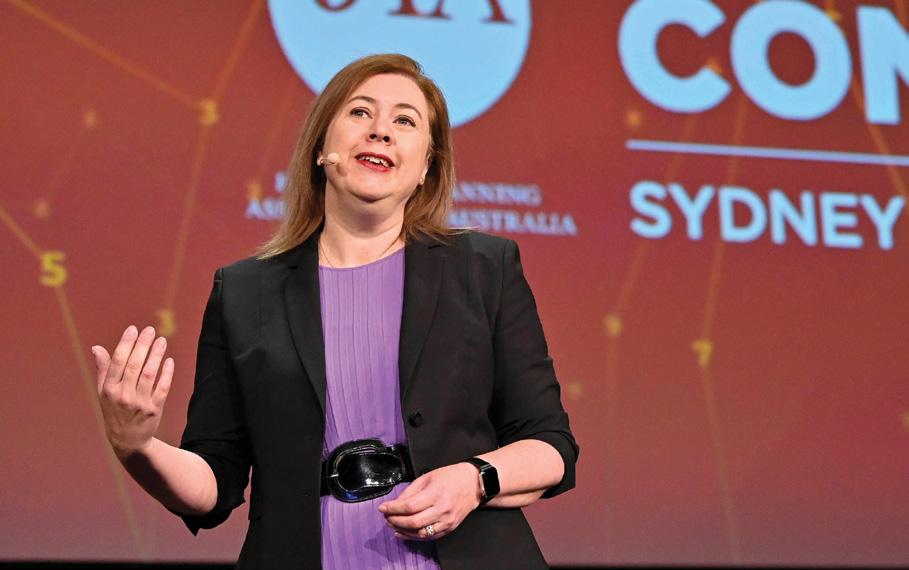
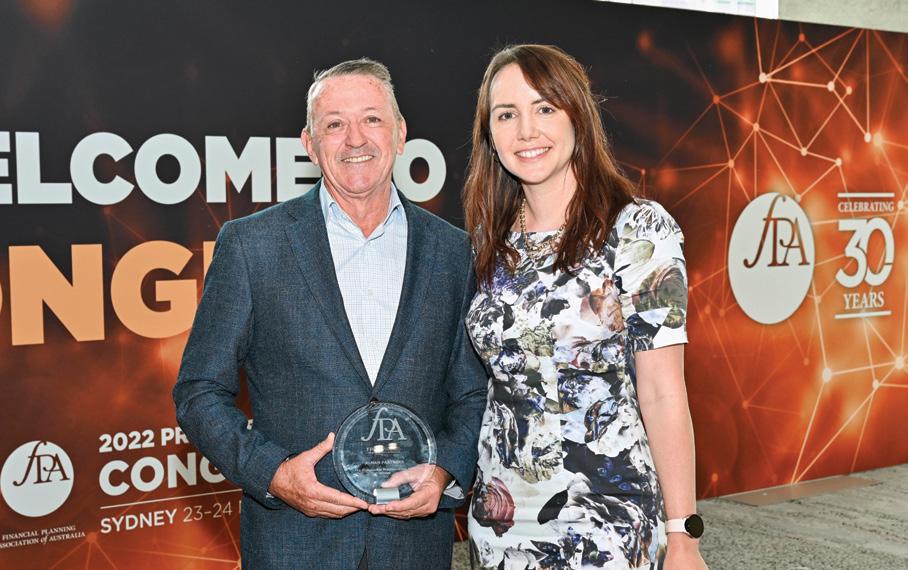

Abood said there are positive signs in many areas of the profession and believes 2023 will mark a “great reset.”
“There has been talk about adviser numbers being down but let’s not forget that new entrants are joining our profession as well,” she said.
“Trust in financial planners is increasing from a low point of 35% in the wake of the Royal Commission to almost 50%.”
Abood also pointed to the willingness of government and regulators to work with advisers on solving the problems of over regulation.
“Governments consulting on ways to improve the adviser exam and bringing more flexibility to the education standards. The Australian Law Reform Commission is working to clear a path through that maze that is the Corporations Act, and all of the many associated regulations,” she said.
“The common factor, of course, is the onerous regulatory structure of our profession, and it must change if advice is not to become a luxury to the wealthy.”
She went on to outline the FPA’s top priorities going forward, including a substantial reduction in the unnecessary red tape and duplicated compliance measures that add to the cost of advice, flexible professional standards, and an extension to the ASIC levy freeze.
“Another one of the quickest and easiest ways to make financial advice more affordable for consumers would be to make it tax deductible,” she said.
Addressing the proposed merger, FPA chair David Sharpe said the association fully back combining with the Association of Financial Advisers (AFA).
“The FPA board is absolutely unanimous in the view that the merger is in the best interest of members,” he said.
“We’re stronger together with the united voice. One single loud, dominant voice representing the lion’s share of financial planners in this country is such a compelling reason as to why this merger should happen.”
A secondary benefit is scale, Sharpe explained.
“Scale to provide bigger events like this Congress like roadshow, scale to provide better CPD and education like our masterclass series.”
“Scale to provide services and tools that you, our members tell us you want you need and you find valuable.”
Sharpe added that 2022 marked 30 years of the FPA.
“For those of you that don’t know, the FPA before itself was born from a merger. It became stronger, bigger, and bolder as a result of that merger,” he said.
“And the board is of the view the merger with the AFA will make us bigger, better and bolder again.”
A rapidly ageing population has changed the face of retirement, London Business School Professor Andrew Scott explained.
Scott said it can be hard to escape the notion that you’re going to have to work for longer.
“If you do the simple calculations, let’s assume you want to retire at 65 on a pension worth 50% of your final salary, if you live until 100 you’ve got to save 25% of your income every year to finance it,” he said.
He said the age increase in working adults is already happening.
“We are seeing rising employment of older people around the world,” he commented.
“Research I’ve done suggests that in the G7, which is seven industrialised nations, 85% of employment growth for the last 20 years is coming from an increase in people aged 50 and above.”
While the labour market is being driven more by people working for longer, Scott points out there are still declining trends in those over 50 and that’s an opportunity for advisers.
“In every country, you see employment fall from 50 onwards. So, there’s always focus on getting people to work for longer after retirement, but we really need to help people working from 50-plus,” he said.
Scott commented that heading into later years it’s not just about the individual and their savings plan; it’s about how they can support a career that creates a feasible saving plan for the long term.
“Retirement is changing dramatically, and one big problem we’ve got is that state governments around the world, they’re looking at state pensions and saying, ‘oh well, we need people to work longer’,” he said.
This changes the parameters of a three-stage life, established in the 20th century “Education, work, and retirement, and it worked very well for life expectancies at around 70,” he said.
“But as we’re living longer, we’re trying to just raise that retirement age; I think that’s going to cause a lot of problems.”
And a good life isn’t just about financial assets either, he noted.
“Other advice I would give is, in my experience, the very best financial planners don’t just think about savings – that’s only part of the issue,” he said.
“Wealth and health are being tied together because, over a long life, those two really are key.”
ASIC senior executive leader Leah Sciacca explained that all financial advisers will need to register with the ASIC Financial Services and Credit Panel, in addition to being registered on the Financial Advisers Register.
Appearing alongside the FPA’s Ben Marshan, Sciacca outlined that some advisers will already be deemed registered because of being
For those of you that don’t know, the FPA before itself was born from a merger. It became stronger, bigger, and bolder... And the board is of the view the merger with the AFA will make us bigger, better and bolder again.
David Sharpe
Over 1200 delegates attended the 2022 conference, hosted in Sydney.
registered with the Tax Practitioners Board, but others will need their licensee to register them.
When Marshan asked the crowd to raise their hand if they were aware of this requirement, next to no hands went up.
“It’s a new requirement that came about as part of the Better Advice Act,” Sciacca explained. Further, a delay to the adviser registration was announced recently, pushing it back to 1 July 2023.
“We’ve been working on the panel and ensuring its efficient and effective operation as the single disciplinary body for financial advisers,” Sciacca said.
Sciacca explained registration will take place through the ASIC Connect portal and will be opened in the second quarter of next year to give licensees enough time to ensure advisers are signed up.

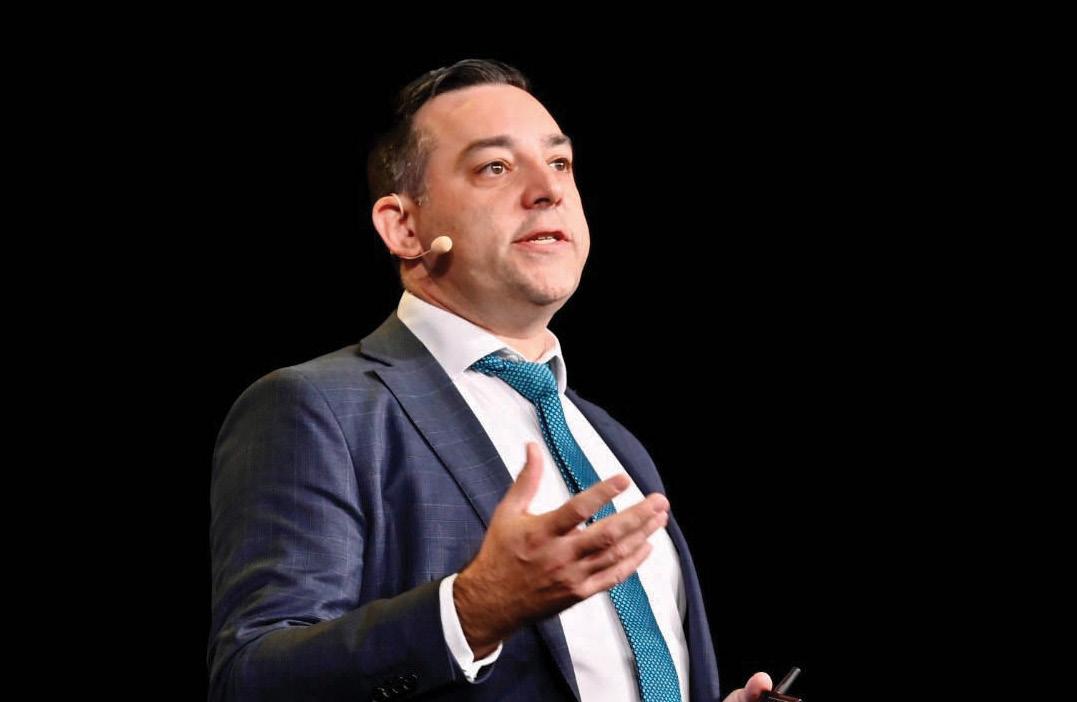


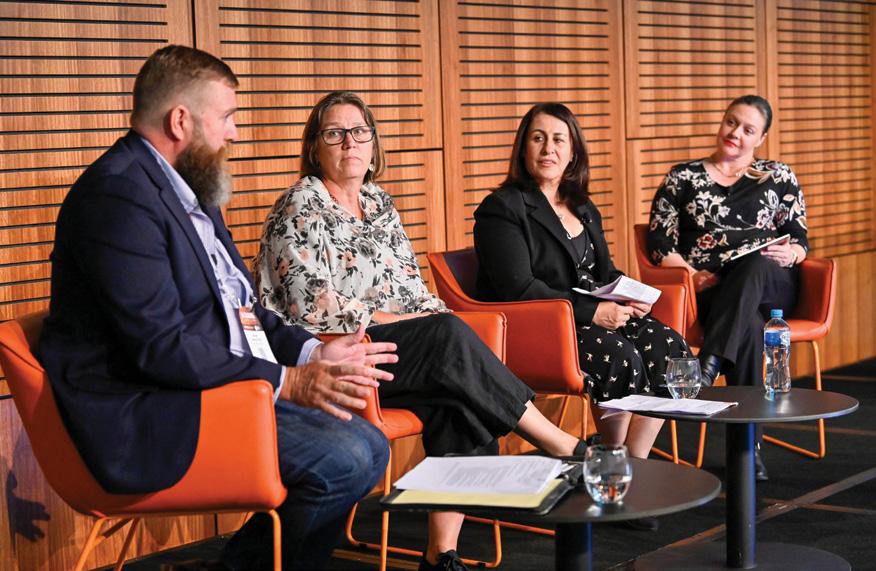

“I think the other distinction from registration versus the existing function for authorised representatives is that licensees are required to make some declarations as they go through the process of registering their advisers,” she said. She said that will be concerning fitness and propriety as well as ensuring advisers are tracking well with education standards.
On a panel, Abood was asked what she expects the advice sector to look like in 2023, and her answer involved the metaverse.
“I’m an optimist when it comes to technology, and I think that it enabling us to do more as financial planners has two major advantages,” she said.
“Firstly, it removes friction from the process.”
There are so many issues there that tech can help with. For example planners shouldn’t be on the phone to Centrelink for an hour, she said.
“Compliance by design is another area where I think technology has a huge amount of opportunity, because we are spending a lot of time on regulation, largely because we have to think about it all the time. But I think technology has got this massive value to add to us,” Abood said.
“By making those processes compliant by design, we don’t have to think about it we just follow the process, and we just know that we comply.”
The other piece is the idea of technology amplifying humanity, providing the opportunity to not just focus on what it is to be human, but to fully realise what it is to be human, Abood said.
One way of doing this is to use AI to match consumers to planners.
“We all know of a client where the fit is not quite right, it’s always an effort, there’s always issues in reviews and trying to get the idea of strategy across is difficult… Honestly, often it’s just a personality mismatch,” she said.
“There are engineers out there already that can do that at scale and work out here is the planner, here are the best clients for this planner who work with who they will have the best level of engagement with. So that’s one practical way I think it can happen.”
Ex-FPA chair Marisa Broome believes that when it comes to regulation for advisers, Chapter 7 of the Corporations Act is not fit for purpose.
Broome said that for 90% of what she does as a planner, she doesn’t need an AFSL.
“Until I start talking about products, that’s when I actually need to be licensed,” she said.
“The rest of the time, when I’m doing the strategic part, which is really what my clients value and what I deliver for them, it’s not actually relevant to the current licensing law.”
Former MP Bernie Ripoll agreed.
“We’re all constrained by regulation in terms of what we do in this industry, and perhaps rather than just focus on how many laws or how many regulators we’ve got, the key point is about addressing its complexity,” he said.
“This is a really difficult part of our economy to navigate, hence why there are so many regulators. And while there might only be four pieces of law, there’s lots of bits within those.
“One of the things always walking through this very messy jungle has been the Corporations Act. So, the question becomes: do we toss it out and start again?”
He said it’s possible that throwing out the Corporations Act is the only way to move forward.
The Act is currently the subject of a review by the Australian Law Reform Commission.
Moving forward, Ripoll said that he would like to see that the financial planning industry collectively deal with this complexity by interconnecting with regulators.
“Advisers won’t care how many laws and regulators there are, so long as it’s interconnected and becomes simpler for them to navigate,” he said.
“It’s about the workload, the complexity, and then how they can deliver on the promise that they’re making to their clients, to consumers and to all Australians.”
Now in their 10th year, the FPA Awards recognise individuals and businesses across Australia who deliver the highest standard of professional and trusted advice to consumers.
“These awards shine a light on those making a difference to the financial planning profession, the financial services industry and to all Australians,” Abood said.
EFS Advice founder and principal adviser Andy Reynolds took home the FPA Certified Financial Planner Professional of the Year Award.
“Andy’s approach to supporting his clients’ understanding of complex financial issues, especially those clients with cognitive issues, is truly moving,” Abood said.
“He really does go above and beyond for his clients and his use of tools such as diagrams and videos to help support clients’ understanding is a practical demonstration of that.”
Meanwhile, the winner of the FPA Professional Practice of the Year Award was Alman Partners. The judges selected Alman Partners based on its clear succession plan, which involved supporting advisers to becoming partners in the practice, and its continued commitment to diversity.
“The judging panel was also impressed by the in-depth annual audit the practice undertakes to be accredited with the Global Fiduciary Accreditation (currently held by just seven Australian firms),” it said.
Future Gen Solutions financial planner Lili Hong was named the winner of the FPA Financial Planner of the Year Award, while the FPA University Student of the Year Award went to Matthew Kanizay of Deakin University.
The honorary Gwen Fletcher Memorial Award was presented to Canberra-based financial adviser Brigitta Hembrow Gersey. fs
Advisers won’t care how many laws and regulators there are, so long as it’s interconnected and becomes simpler for them to navigate.
Bernie RipollOfficial media partner
Apex Group has acquired Pacific Fund Systems (PFS) from its co-founders and Pollen Street Capital for an undisclosed amount.
PFS runs specialist accounting and administration platform PFS-PAXUS, which supports all manner of funds, including hedge funds and private equity vehicles. It has offices in Australia and Europe and is used by over 4000 individual users by more than 100 clients, representing about US$1 trillion in assets.
PFS was founded in 1999 and Pollen Street Capital acquired its interest two years ago via its Fund IV.
Apex Group will now be able to act as a singlesource provider of services, it said, adding that the acquisition “will expand use of the technology platform to enhance the delivery of timely, accurate and independent portfolio accounting, fund and investor reporting.”
“Through a combination of partnerships with award winning technology providers, as well as our own market leading platforms, we deliver high quality solutions to asset managers globally. PFSPAXUS is a proven global technology solution for the funds industry that enables our clients and third parties to automate all fund administration components on a single platform,” Apex Group founder and chief executive Peter Hughes said.
“Bringing PFS-PAXUS into the group will help us to continue exceeding client expectations by delivering a single-source solution which improves administrative efficiencies, implements essential controls, and manages our clients’ operational risk.”
PFS chief executive Paul Kneen also commented on the acquisition, saying: “PFS is dedicated to providing a first-class global business solution to its clients and we are excited to be joining Apex Group which shares these core principles and objectives.” fs
Link Fund Solutions is the subject of a new group action in England related to the now infamous Woodford fund failure.
Law firm Leigh Day has served the action after it and another firm, Harcus Parker, had applications for a Group Litigation Order regarding their respective claims dismissed in December. Claimants represented by the firms were then told to serve any claims by January 18. About 20,000 claimants are represented by the firms.
“From our investigations, we believe that Link allowed WEIF to hold excessive illiquid or difficultto-sell investments, which caused investors significant loss. In doing so, we consider Link breached the FCA Handbook rules and failed to properly carry out the management function of the Woodford Equity Income Fund,” Leigh Day’s action states.
Acknowledging the action via an ASX statement, Link Group said: "LFS will vigorously defend itself against the proceedings.”
There is also a third class action that has been served against Link, representing a further 3200 claimants. fs
01: Charlie Javice former head of student solutions JPMorgan Chase
Jamie Williamson
JPMorgan has shuttered the financial planning fintech it acquired in 2021 and is suing its founder, claiming most of its users were fake accounts created to inflate the business’ value.
In September 2021, JPMorgan Chase acquired Frank, a platform that assisted college students in applying for and managing financial aid packages, as it looked to increase its interactions with a younger consumer base. Under the deal, which set JPMorgan back US$175 million, Frank founder Charlie Javice 01 was brought on as head of student solutions.
At the time, Frank claimed to be used by around five million students at over 6000 colleges and universities in the US. It also had backing from some high-profile investors, including the co-founder and chief executive of Apollo Global Management.
However, JPMorgan is now suing Javice, saying it has discovered about four million customer accounts were fake. In court documents, the bank claims Javice paid a data scientist to use “synthetic data” techniques to create a list of 4.265 million “students” that did not exist.
The discovery was made after JPMorgan sent out a marketing email to what was believed to be about 10% of users and 70% of the emails bounced back, the documents show. In reality, Frank only had about 300,000 users.
Javice was terminated from her role in November 2022.
In January, JPMorgan shut down Frank, with the website now showing a message that reads: “Frank is no longer available.”
The next day, JPMorgan released its Q4 earnings, showing it has set aside US$1.4 billion in anticipation of a mild recession. fs
Four people have been jailed in the UK over a $37 million fraud carried out on an Australian cryptocurrency exchange five years ago.
The UK’s Crime Prosecution Service (CPS) said Stephen William Boys, Kelly Caton, Jordan Kane Robinson and James Austin-Beddoes were sentenced to a combined 15 years in prison over their involvement in a scam that “exploited a loophole” on the platform – reported to be Australian-based Coinspot.
The scam was masterminded by James Parker, who died in January 2021 before he could be prosecuted. Parker withdrew dishonestly obtained crypto assets worth $26 million from his trading account, while Caton and Robinson did the same to the tune of $4.74 million and $2.99 million, respectively.
Boys was Parker’s Dubai-based financial adviser and was responsible for converting the crypto into cash, which was then laundered through various foreign online accounts.
According to the Lancashire Constabulary, the offenders handed out thousands of dollars in gift cards in the street and “cars were bought for people Parker met in the pub.” Luxury watches, houses, designer goods were also purchased.
“During the trial Boys told the court how he took £1,000,000 cash ($1.76m) in a suitcase to
buy a villa from Russians he met in the back office of an estate agent and paid £60,000 ($105,000) to pay off corrupt officials so he could carry on laundering money,” Lancashire Constabulary said. Boys will serve six years, Caton and Robinson will serve four and a half years each, and Beddoes was sentenced to 18 months, 12 of which are suspended, and 20 days’ rehab.
The CPS said “a very significant amount” of the assets have been returned or are in the process of being recovered for Coinspot. The prosecution of the four offenders was achieved through cooperation with Australian and Finnish authorities, the CPS said.
“These offenders used the internet from the comfort of their own homes to obtain tens of millions of pounds worth of Bitcoin which did not belong to them. Cyber-enabled crime presents an increasing threat to international economic stability, as well as to honest individual investors in cryptocurrency,” specialist prosecutor Jonathan Keller said.
“The CPS advised our police partners throughout this international investigation. Painstaking analysis of vast amounts of digital material and collaborative liaison with the Australian and Finnish authorities enabled us to mount a successful prosecution against these criminals.” fs
Chloe Walker Countplus’ Moggs Accounting + Advisory (Moggs) has acquired Shepparton-based Timothy Trevor Gubbins.
As part of the transaction, founder Timothy Gubbins is expected to remain with the business for a period of one year to help assist with an orderly transition.
Moggs managing principal Rodney McLeod said the acquisition would benefit communities in regional Victoria.
“This acquisition is a terrific outcome for our clients as we add expertise and experience to our growing business,” he said.
“We understand the unique needs faced by communities in regional Victoria and look forward to reinforcing Moggs’ outstanding reputation for delivering positive client outcomes.”
Meanwhile, Countplus chief executive Hugh Humphrey said the acquisition formed part of the business’ strategic growth objectives.
“At Countplus, we identify quality businesses that can add value to our existing Member community and have the resources to make these transactions happen. This acquisition is a terrific outcome for our people and our clients,” he said.
The transaction is expected to be completed on February 15.
Recently, Commonwealth Bank of Australia increased the limit of indemnity provided to Countplus, from $300 million to $520 million. The bank said this was to cover certain remediation activities that were identified at the time of sale. fs
We are pleased to finalise the transaction that combines two of Australia’s oldest and most respected active asset management businesses.
01: Rob Adams chief executive Perpetual
Cassandra
Perpetual has completed its Pendal Group acquisition and confirmed two board appointments.
“We are pleased to finalise the transaction that combines two of Australia’s oldest and most respected active asset management businesses," Perpetual chair Tony D’Aloisio said.
"We welcome the talented Pendal teams to Perpetual and look forward to supporting the executive team as they execute and deliver on our global growth plans to create shareholder value."
The foreshadowed appointments of former Pendal Group non-executive directors Kathryn Matthews and Christopher Jones to Perpetual’s board took effect in the last week of January..
Matthews will join the board’s audit, risk and compliance committee, while Jones will join the board’s people and remuneration committee, and both will also join the board’s investment committee.
As part of the changes, existing Perpetual in-
dependent non-executive director Craig Ueland has retired.
Non-executive director Greg Cooper will replace Ueland as chair of the board’s investment committee.
Perpetual managing director and chief executive Rob Adams 01 commented the new leadership team is focused on delivering global growth ambitions and executing on the strategic and financial benefits afforded by this transformational acquisition
"Including delivery of enhanced scale efficiencies; growth of our global distribution footprint; building on our leadership in ESG and realising $60 million in expected run-rate pretax expense synergies,” he said.
Adams added the client consent process has proven to be “very successful” with Pendal achieving consents from over 98% of Pendal clients, by client revenue.
Despite this, Perpetual reported it took a $1.2 billion hit in December ahead of the merger. fs

Every middle-class white-collar services sector employee has by now heard of the 'generative artificial intelligence' website ChatGPT.
ChatGPT exploded into the mainstream mid-January this year and within weeks had stirred up a frenzy. In a rendition of the reaction when calculators first went mainstream in Australia, hundreds of schools and universities quickly announced they would ban it.
Brumbie By Alex Dunnin alex.dunnin@ financialstandard .com.au www.twitter.com /alexdunninTrouble for them is that it’s generative content, meaning its newly written and plagiarism checkers won’t spot it.
This is what happens with every new technology leap: the establishment panics. The same occurred when internet search engines exploded onto our computer desktops and when smartphones were unleashed. But few of us probably expected the greatest disruptor of all, Google, to announce it would block any AI-generated content from being displayed in search results.
Causing the excitement is that ChatGPT is one of the first consumer-facing AI services (it's not an app) that non-expert users can interact with to ask all manner of questions, assign all manner of tasks. Its responses range from remarkably conservational but surprisingly sharp specific answers all the way through to mini essays, recipes, re-written but
simplified emails, letters and computer code.
Many of us may be thinking that friendly, easy to use AI has just crept up on us. Not technology insiders, they've been watching these developments gather pace over the past few years under cover of the pandemic. Which might be why these same insiders are telling us that this is just the beginning.
There are two ways to respond this. One, if you're a services sector professional who gets paid a lot of money to rehash other people's work or cite open-source information, you'd be wise to start updating your resume.
Two, reimagine. AI is one of the most excitig technological breakthroughs in decades that will transform many sectors of the global economy. We're just not sure how. If so, better to be part of the change than fall victim to it.
We also need to remember that ChatGPT is just a prototype and has many weaknesses and limitations that even its developer, the OpenAI corporation, is warning us about. But already I can see some useful test case generative AI applications that could fix a few long-standing problems close to home in our own wealth management industry.
Some easy ones that spring to mind concern how superannuation is bogged down with black-
letter-law compliance, legislative complexity and administrative intensity with vast armies of experts paid big salaries to explain it all to the rest of us. Maybe not for much longer.
So play our cards right and within a few years many of those compliance, legislative and pension entitlement experts who spend most of the lives keeping up with technical details, and the thousands of analysts working for active investment managers only to be gazumped by the market index each year, might be able to recraft their roles and get back to actually adding value to their employer's clients' lives.
Super fund trustees are meanwhile crying out for scalable advice services to help explain to fund members how to best use their super fund. These trustees might now have their solution. The dwindling number of human financial advisers, rather than be threatened by this, would surely welcome the support of generative AI to improve service quality.
There's a lot of water to flow under the bridge before these AI efficiencies began to happen in wealth management. But one thing we can count on is that generative AI and how to either harness, regulate or tame it will be 2023's defining issue for corporate Australia. Doubly so for a services sector like super. Giddyup. fs



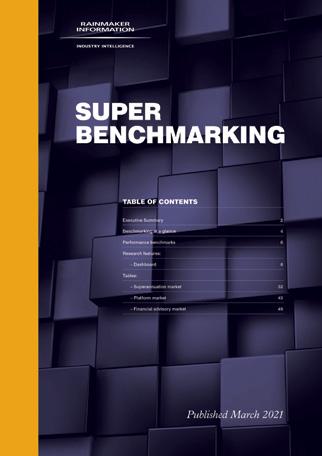
It’s on again. The world’s biggest economy is again running out money and has to urgently pass legislation to increase its debt ceiling. This would the 90th time since 1959.
In that time there has been 13 presidents who raised the debt ceiling on average at least once a year. And before partisan critics start espousing myths about which US political party is the better fiscal manager, 60% of debt ceiling increases were authorised by Republican presidents and only 40% by Democrat presidents.
While for most nations it seems bizarre to fight over national debt ceilings, in the US, new government borrowings must be authorised by a vote of the Congress.
The debt ceiling, or limit, is the total amount of money that the US government is allowed to borrow to meet its existing legal obligations, including social security and Medicare benefits, military salaries, interest on the national debt, tax refunds, and other payments.
It does not authorise new spending, instead it simply allows the government to pay for existing obligations that Congresses and Presidents of both parties have already made.
“Failing to increase the debt limit would have catastrophic economic consequences. It would cause the government to default on its legal obligations – an unprecedented event in American history. That would precipitate another financial crisis and threaten the jobs and savings of everyday Americans – putting the United States
right back in a deep economic hole, just as the country is recovering from the recent recession,” explained the US Treasury.
Put bluntly, just as the US economy, and other developed nations economies, are showing signs of optimism as inflation comes under control and investors are beginning to recover their confidence, the fear is that if Congress doesn’t authorise the debt ceiling increase that capital markets globally could take a beating plunging the world’s financial system into deep recession.
In normal times it would be a no-brainer that Congress would wave-through this latest debt ceiling increase, or at least authorise it after going through some limited theatrics.
But the US Congress house of representatives is on a knife-edge following the 2022 mid-term elections that were a disaster for the Republicans. Just a few weeks ago it took House Speaker, the conservative Republican Kevin McCarthy, a record 15 votes to just get over the line with a wafer-thin majority.
The political problem is not that the Congress will split on party lines on this issue, but that the Republicans might implode and even throw their Speaker out. As a result, there are grave concerns the ginger group of extremist Republicans that complicated McCarthy’s election to the Speakership could hold Congress to ransom.
At the start of 2023, US government debt and the debt ceiling stood at US$31 trillion. fs
Eisenhower | 1959-61 Kennedy | 1961-63
Johnson | 1963-69
Ford | 1975-77
Nixon | 1969-75
Carter | 1977-81
GHW Bush | 1989-93
Clinton | 1993-01
GW Bush | 2001-09
Trump | 2017-21 Biden | 2021-22
Reagan 1981-89
Obama | 2009-17
While last year was a “shocker” for both bonds and equities alike, allocating to fixed income securities in 2023 offers an attractive yield for investors, according to GSFM investment strategist Stephen Miller.
“Inflation developments in the US represent a core indication of the Fed’s approach, as core inflation is running at a three-month annualised rate. This is a measure of the pulse, at around 3% and it was 7.9% in June,” Miller said.
“This shows an unambiguous turn down in inflation- which is the good news. It means that the peak policy rate will probably be somewhere around about 5%. That's where the Fed is, that's where the market is.”
“I think that the Fed knows that and that's why they're getting the message out.”
Closer to home, Miller said that the Reserve Bank of Australia (RBA) has stumbled in its management of inflation.
“I think the RBA and local rate markets continue to underestimate inflation momentum,” he said.
“Well-intentioned but potentially flawed changes to the regulatory environment, particularly in relation to the wage-setting framework, run the risk of entrenching higher inflation in Australia compared to elsewhere.”
Against that background, the RBA should be possessed of an acute inflation anxiety in its approach to policy settings through 2023, he said, adding: “The inflation impact will be the wildcard for investors in the year ahead.” fs
While the risk of recession is high, it's likely to be avoided down under, according to AMP head of investment strategy and chief economist Shane Oliver.

According to Oliver, a slump in consumer spending along with weaker global growth, will see Australian growth slow to around 1.5% this year.
“2022 was not so good and economic growth will slow sharply this year thanks to rate hikes and cost of living pressures (with a high risk of recession in the US and Europe), but there are several reasons for optimism,” Oliver said.
“While 2023 is likely to remain volatile, easing inflation, central banks getting off the brakes (with the RBA at or close to the peak on rates), economic growth likely stronger than feared, and improved valuations should make for better returns.”
Oliver said that the Reserve Bank of Australia is less aggressive and less likely to overtighten compared to other major central banks.
In addition, Oliver said that a rebound in Chinese growth is likely to support export volumes and prices.
Oliver cited the rapid rebound of immigration and a solid business investment outlook as other considerations to support a continuation of the relative outperformance of Australian shares in 2023. fs
Inflation, bonds, China, and the energy transition are at the top of AXA IM chief investment officer Chris Iggo’s 01 list of themes that will shape 2023.
Providing an outlook for the year ahead, Iggo said: “The economics profession did not prove to be very good at forecasting inflation in 2021 beyond that it might go up.”
“As such, any speculation that it will come down again carries the usual health warnings.”
However, top of his list, he said disinflation is underway.
According to Iggo, disinflation will reduce the need for additional increases in interest rates beyond what is already priced in i.e., 5% for the US Federal Reserve’s fed funds rate; 3.25% to 3.5% for the European Central Bank’s deposit rate; and 4.5% for the Bank of England’s bank rate.
“Further declines in inflation rates in the months ahead should be a positive driver of returns in both bonds and equities,” Iggo said.
“The implications for interest rates are clear, which should boost bond performance.”
While US real yields have not moved down enough yet to reverse the outperformance of value versus growth, at least so far, Iggo said that growth has started to come back.
“The early months of 2023 will be telling,” he said.
“The first half of the year tends to see the highest monthly increases in prices as wages and prices are increased. Given the amount of industrial action currently plaguing Europe there are some upside risks.”
Similarly, the re-opening of China might contribute to higher global energy and commodity prices, re-invigorating upstream costs for global companies.
“Both global and local Asian investors are likely to increase their exposure to Chinese equities, providing further support for the rally,” Iggo said.
On fixed income, Iggo said that Asian credit has already benefitted from more optimism around the Chinese growth outlook and the property sector’s stabilisation.
“With investment grade Asian US dollardenominated bonds yielding in the 5%-to-6% range global credit and emerging market bond investors are also likely to up their allocation to the region.”
According to Iggo, the fourth and final big theme in 2023 is the potential for an acceleration of investment spending in the energy transition.
In the US, this is linked to the Biden administration’s Inflation Reduction Act which will provide subsidies up to $465 billion for investment in renewable energy, electronic vehicles, semi-conductors and other technologies, Iggo said.
Therefore, it specifies that a lot of the content must be US produced.
He added: “In the rest of the world, governments are also likely to play a similarly interventionist role to address the need to meet CO2 emission targets and respond to heightened concerns about security in energy and technology.” fs
Jamie Williamson
The official Consumer Price Index jumped 1.9% in the December 2022 quarter, rising to the highest annual rate of inflation in over 30 years.
The figures were released by the Australian Bureau of Statistics (ABS) and mark the fourth consecutive quarterly rise greater than any seen since the introduction of GST in 2000.
The annual CPI increase came in at 7.8%, the highest rate seen since 1990. While it didn’t hit the Reserve Bank of Australia’s expectation of 8%, it does outpace most economists’ forecasts.
The increase was primarily driven by increased domestic travel and accommodation (+13.3%), electricity (+8.6%) and international travel and accommodation (+7.6%). While these were to be expected given the time of year, the ABS noted that the increases were notably higher than previous December quarters.
Meanwhile, growth in prices for new dwellings (+1.7%) slowed relative to recent quarters (+3.7%)
in September and +5.6% in June) but remained stronger than historic norms.
"Labour and material costs are driving price growth in this area, with signs of material cost pressures easing," ABS head of price statistics Michelle Marquardt said.
"Slowing demand for new dwelling construction was reflected in a lower quarterly rate of inflation for new dwellings this quarter compared with the past five quarters.”
Food prices continued to rise, driven by meals out and takeaway foods (+2.1%) as dining establishments pass on rising costs. However, vegetables (-10.2%) partially offset the rise, as the effects of unfavourable weather earlier in the year eased.
"The annual increase for the CPI is the highest since 1990. Annual inflation for goods such as new dwellings and automotive fuel steadied this quarter, however we saw an uptick in inflation for services such as holidays and restaurant meals," Marquardt said. fs
Alex Dunnin
Unlisted property continues to enjoy high relative returns, finishing the 2022 calendar year with a total return of 6.4%, according to a research release produced by MSCI.
Retail property funds, meaning funds holding shopping centres, performed even better delivering an average 7.0% compared to office property funds that delivered an average 4.6%.
Where MSCI’s index analysis gets interesting is the split between the capital growth return and the income return. Overall, the index splits the total return 31% towards capital growth with 69% coming through income.
Much of the return coming through income, being in the main rents, goes a long way to alleviating concerns due artificially inflated valuations. For retail funds the income return share was 70% but for office funds it was an even higher 85%.
Such high proportions of the unlisted property fund index return coming from income should, however, raise fears about the future dynamics driving this market sector.
While it’s good news that the retail property
index had capital growth in 2022 of 2.1%, it nevertheless trails far below inflation. The 0.7% capital growth in the office property segment being one-third this should meanwhile set off alarm bells regarding what post-COVID hybrid working models, ie, working from home arrangements, might do to future property values of office developments.
Property owners, being investment managers and their super fund stakeholders, may have little choice but to push up rents to maintain returns – a move that could herald more disruption among office-based businesses and consumer retailers.
In contrast, industrial property funds are the shining star. MSCI’s analysis reports that the segment delivered a total return in 2022 of a stunningly high 9.9%. Even more remarkable was that 60% of this was driven by capital growth.
Rainmaker data showsAustralia’s investment managers hold $368 billion in property assets. But flowing on from the MSCI analysis, the valuations red flag is that 85% of the sector’s growth is from unlisted holdings. fs
Sanjesh Pinnapola
With 2022 finally behind us, it’s time to wrap up what was a disastrous one for investors. Causing the carnage was the Russian invasion of Ukraine. Then inflation returned, thanks in large part to global supply chain blockages due China’s failed ‘zero COVID’ policy, that triggered consequent and sharp increases interest rates.
In Australia, the year begin with headline 12-month inflation hitting 3.5%. The Reserve Bank of Australia (RBA) was too slow to respond, evidenced by it taking until May to state that it expected inflation would peak at around 6% by the latter half of the year.
It was wrong. Inflation surpassed these forecasts to peak at 7.8% at the end of December.
Globally it was more of the same story. The US started the year with an inflation rate of 7.1%. In the UK it was 5.4%. At least in India it was only 5.7%. However, supply shocks and rising energy prices almost everywhere meant inflation wouldn’t peak until the back half of the 2022 for each of them at 9.0%, 11.1%, and 7.8%.
These conditions gave central banks globally no choice but to deploy their main weapon in combatting inflation: interest rates. And lift them they did, rapidly.
The RBA raised its target cash rate from the record pandemic era low of 0.1% to 3.1% by year’s end; the fastest pace of rate rises yet seen. The US Fed was more aggressive. It lifted its interest rates from 0.25% to 4.5%. The UK played middle of the pack and lifted from 0.25% to 3.5% over the same period.
Given fixed interest markets intertwine both interest rates and inflation, it’s hardly surprising these rate rises saw bond market returns plummet.
The Australian fixed interest market, as measured by the Bloomberg Australia (5-7Y) Index, delivered a woeful -9.1% for the calendar year. The Bloomberg Global Aggregate Index paints an even worse picture for the international fixed interest investors with its -12.3% return.
This aggressive central bank action may have done most of its job. US inflation has already slowed to 6.5%. Australia should soon follow suit. fs
Figure 2. Property funds management, segment FUM vs growth Figure 1. Returns from unlisted property, 2022 calendar year
Andrew Pease has come a long way from his quiet hometown on the Bass Strait. One thing that has stayed with him throughout his impressive career in financial services is his down to earth nature. Chloe Walker writes.
Awise man once said: “It is better to be roughly right than precisely wrong.”
That man wasn’t Russell Investments global head of investment strategy Andrew Pease, but it was one of his favourite economists and authors, John Maynard Keynes.
Alongside Keynes, Pease, an economist himself, also admires the work of legendary thinkers such as Ben Inker, James Montier, Michael Mauboussin, Howard Marks, and, closer to home, Jack Gray and Shane Oliver.
“I admire these people because of how they think about markets,” Pease says.
“I'm a process driven investor, so I like people who also have structured frameworks.”
Now, there’s many who might consider Pease to be on the same level as his idols.
Over the last 33 years, Pease has built a career out of maintaining frameworks. He’s held a range of notable roles in both Australia and the UK, including as an economist at the Reserve Bank of Australia, head of research at Nomura Securities and chief economist at JP Morgan.
Today, based in London, Pease works with portfolio managers across Russell Investments offices to guide the tactical positioning of its funds across the globe.
With all the success Pease has experienced in his career, you might not expect him to be as down to earth as he is - maybe it’s just because he’s quintessentially Aussie, having grown up in a small Tasmania town called Ulverstone on the Bass Strait.
“Growing up, Ulverstone seemed like a big place - like that's where the world was. It was a small rural community and the big cities to me were places like Burnie and Devonport. The biggest place I went to was Hobart, and that just seemed like an impossibly large city,” he laughs.
In his teenage years, Pease earned an allowance by working Friday nights at his father’s shoe store.
“I remember fitting kids school shoes and all the orthopedic shoes for the retired ladies,” he laughs.
While he thoroughly enjoyed his upbringing in Ulverstone, it did have its geographical challenges in the 1980s. Pease didn’t attend university until he was 21, largely because the University of Tasmania was so far away.
In the meantime, he spent three years at the Department of Social Security, now known as Centrelink.
It was during this time, working through the recession, Pease realised he was interested in a career in finance. Transferring to Hobart to work for the Official Receiver in Bankruptcy convinced him he needed a degree in economics. So too did the floating of the dollar in 1983.
“There was so much debate about what it all meant, and economists were becoming promi-
nent talking heads on all the TV shows. I found it incredibly interesting,” he says.
Now at university, Pease was lucky to have a great professor in Harry Campbell, who brought recently graduated PhD students over from North America and Canada to teach in its Honours Program.
At the time, there were only three students in the program. Pease says this was quite fortunate because it meant that when the Reserve Bank of Australia (RBA) and Commonwealth Treasury came looking for recruits, they took all three.
Pease and another were selected by the RBA, and it was a great place to start a career, he says.
“I spent four or five years at the RBA, and others that worked there during my time were Chris Kent and Luci Ellis, and they were really some of the smartest people to be working with,” Pease says.
At the time, markets were volatile, and Pease knew he didn’t want a career in central banking.
Pease went to Japanese investment bank Nomura Securities, taking on the role of head of research for Australia.
“It was only a small business in Australia which appealed to me. It was a lovely firm with great people," he says.
“They were doing these things at the time called reverse dual-currency samurai bonds, a simple but incredibly successful product."
“Nomura provided me with a great opportunity to build out a research profile. I was running a research team in FX and bonds, I had a commodities strategist, an equities strategist, and I was running a small team for research.”
This was followed by a four-year stint as chief economist at Ord Minnett/JP Morgan, before he switched to the buy-side at Macquarie Asset Management.
Finally, in 2006, the call came from Rus sell Investments, with the firm telling Pease its plans to move into investment strategy.
“I wanted to understand how to dynamical ly adapt funds to deal with markets - and that seemed like a super interesting role,” he says.
Fast forward nearly 17 years and Pease has certainly made his mark at the global invest ment manager. As well as heading the invest ment strategy team, he also runs a plethora of its internal groups.
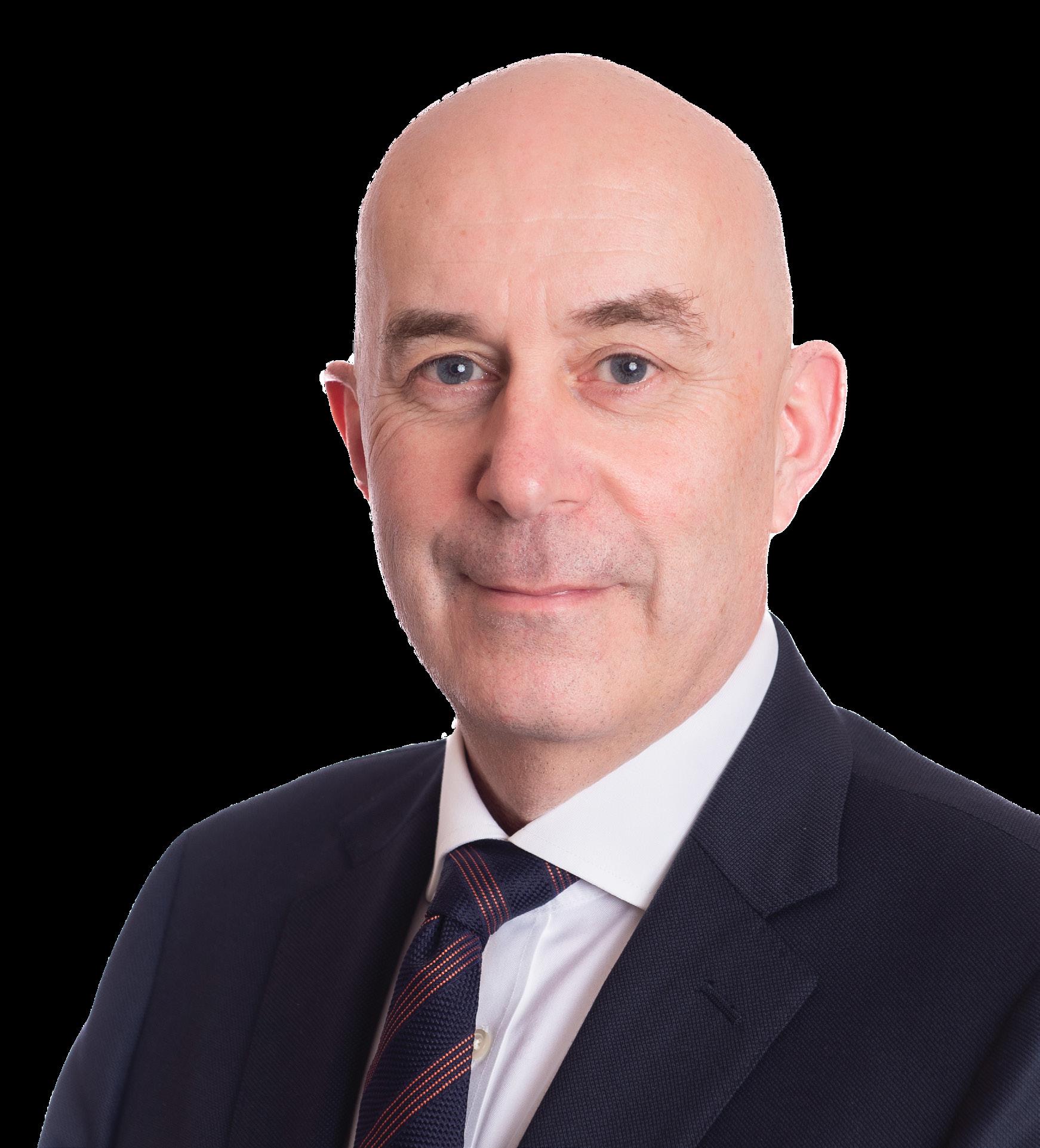
“Russell is a very intellectual asset manager,” Pease says.
“There are so many people with strong aca demic backgrounds in finance and I really enjoy working alongside them.”
As a leader of highly qualified professionals, Pease says the secret to success is simply to fa cilitate, rather than manage.
“When I bring in high level profes sionals, my role is not to tell them what to do, but rather to set the frameworks,” he says.
When setting frame works, Pease says it’s important that every one agrees with the
underlying analytical framework of how economies and markets evolve.
“In strategy and economics, you've got different frameworks through which you can analyse things, but everyone’s got to agree on a central model that drives how the world works,” Pease says.
“So as a leader, particularly in a research team, there's got to be an underlying process and framework that everyone thinks, ‘Yes, that makes sense, or I agree with that, or I can debate within these parameters’, and that's how you get the most constructive outcome.”
Pease himself has developed a framework called Cycle, Value and Sentiment for analysing asset markets.
“The framework is for thinking about asset classes in a dynamic way and blending that into how we think about asset class evolution over a five to 10-year long run strategic consolidation,” he says.
“That’s a lot of what I think about.”
At the end of the day, he says his role is about driving consistent investment processes.
“In asset management, investors with no process can be lucky, and good investors can have periods of bad luck,” he says.
“But ultimately, process determines performance. If you’ve got a well thought-out investment process and apply it consistently, based on a philosophy that you believe in, which has a theory of how asset prices perform, which is credible, then ultimately that should be the type
In asset management, investors with no process can be lucky, and good investors can have periods of bad luck... But ultimately, process determines performance.
Andrew Pease